




Global Gaming Business Magazine GGB December 2022 • Vol. 21 • No. 12 • $10 All or Nothing Bally’s quest to dominate the omnichannel universe REGULATING REGULATORS AINSWORTH’S HARALD NEUMANN MARKETING: THINK SMALL PLAYER PAYMENT PROTECTIONS Association of Gaming Equipment Manufacturers DOING THE NUMBERS Why slot math is often the margin for success FINALLY, Europe’s First IR And more 10 trends for 2023

Trending for 2023
Our annual rundown of the Top 10 trends for the coming year reflects an industry fully emerged from the Covid-19 crisis and ready for growth, with opportunities ranging from integrated resorts in Europe and the Philippines to potentially lucrative new jurisdictions like Texas, and challenges like California sports betting.
By Julia Carcamo, Roger Gros, Suzanne Perilloux Leckert, Frank Legato, Glenn Light, Jess Marquez, Patrick Roberts, Richard Schuetz, and Michael Zhu

FEATURES
14 Math Rules
Creative slot game design can only be brought to the finish line by effective program math, which is why mathematicians are essential to the development process.
 By Frank Legato
By Frank Legato
On the cover: Melco Resorts & Entertainment’s City of Dreams Mediterranean



38 Watching the Detectives
With some jurisdictions appointing gaming regulators who know nothing about the industry, and a few using gaming commissions as patronage dumping grounds, many ask who is regulating the regulators.
By

Marjorie Preston

42 Payment Evolution
As the industry sorts through a potpourri of cashless payment options, the worlds of gaming and fintech continue to converge.
By Dave Bontempo
32 Bally’s Bounce
Since its acquisition of Bally’s Atlantic City and subsequent rebranding from Twin River, Bally’s Corporation has grown into an omnichannel powerhouse, and the growth is by no means complete.
By Roger
Gros
Vol. 21 • No. 12 COLUMNS CONTENTS 10 AGA Records Fall Anton Severin 12 Fantini’s Finance Opportunities and Challenges Frank Fantini 35 Marketing How to Win in 2023: Think Small Rich Sullivan 4 The Agenda 6 By the Numbers 8 5 Questions 13 AGEM 36 Emerging Leaders With the AGA’s Cait DeBaun, the New Jersey DGE’s Jamie McKelvey, and Pechanga Resort’s Agata Maher 46 New Game Review 50 Frankly Speaking 51 Cutting Edge 52 Goods & Services 53 People 54 Casino Communications With Simon Thomas, CEO, Hippodrome Casino DEPARTMENTS
DECEMBER 2022 www.ggbmagazine.com december
Global Gaming Business Magazine 18 COVER STORY
3
My Macau
By Roger Gros, Publisher
Granted, I was far from the first gaming industry journalist to visit Macau when the Venetian Macao opened in August 2007. I had heard so much about the “capital of gaming” because even 15 years ago, the revenues it achieved far outpaced any other gaming jurisdiction in the world, including Las Vegas. I had a good frame of reference for the opening of the Venetian since I had spent so much time in the Las Vegas version of the same property. But the Macau version just seemed bigger and better—and certainly more crowded. And I was immediately hooked.
As a former dealer, I relished a casino floor comprised largely of baccarat tables, my favorite game to deal. Those pesky slot machines were limited to the margins of the casino floors, and, at that time, weren’t very popular.
I returned to Macau every year until 2017 because I had been a consultant to G2E Asia, helping them set up the conference program at the event. Every year I’d return, there would be a spectacular new property, whether it was an expansion of the Las Vegas Sands footprint, the amazing Galaxy project, which will debut Phase IV in 2023, Melco’s City of Dreams integrated resort with several different fabulous hotel brands and spectacular architecture, the two other U.S. entries, Wynn Resorts and MGM Resorts, each of which had familiar, yet Asian-focused properties, and of course the original SJM, Stanley Ho’s family flagship, Lisboa.
I came to look forward to my trips each year, not only for the amazing facilities that were going up but also for the incredible executives who were truly making it the world capital of gaming. Of course it all started with Mr. Ho, but it truly broke out with the vision of Sheldon Adelson, who saw gold in a wet, reedy marsh separating two neighborhoods in Macau. Adelson, along with Bill Weidner, Brad Stone and Rob Goldstein, transformed that marsh in what we know as the Cotai region today, home to almost a dozen integrated resorts, with thousands of hotel rooms, many hectares of meeting space, non-gaming attractions and restaurants that will satisfy any taste bud. I’d start to list the executives in Macau that I was most impressed with but I’m sure I’d leave out someone important, but it’s safe to say that they were some of the most talented and innovative people that I’ve met in my 40-plus years in gaming.
Since I haven’t been back since 2017, it’s almost inconceivable to me that those casino floors that were
once packed from morning to night with players wagering side by side and over the shoulders should be sparse and empty. The pandemic has almost been a death knell for the gaming industry in Macau. The companies have poured millions of dollars into the maintenance of their properties and the well-being of their workforce, with little in return. The “zero tolerance” policy of mainland China seems to be insane given how the rest of the world has recovered from the Covid situation. Yes, there are still cases popping up all over the world, but their severity is much diminished. And to sacrifice the gaming industry at that altar seems to be short-sighted.
And then we’ve got the situation with the VIP operators, the junket guys. When I was helping to put together the G2E Asia conference program, we always tried to include a panel of experts to talk about that market, which contributed around 70 percent of gaming revenue in those days. The VIP market was not the players on the main casino floor. They all had special rooms that they had built inside the casinos to host their players in the luxury—and privacy—they desired.
So it wasn’t always easy to get them to participate. But one year we had a panel consisting of some of the most powerful junket operators in town, and someone asked a question about the amount of money gambled on the tables—and beneath them, in the form of illegal bets. There was no hesitation when the operator answered there was 10 to 20 times more money bet under the tables than on them. There was an audible gasp throughout the room, but I saw the fellow panelists all nodding their heads.
With the recent crackdown on these VIP companies, that situation is over. The casino companies are now focusing on what they call the “premium mass,” that is, the good players but not the “whales” of the VIP market. For sure, those whales will return, but it will be under the strict rules of the Chinese government.
So the “good old days” of the “Wild West” Macau are clearly over. When—and if—the Chinese government reopens the borders, satisfied they stamped out every last case of Covid, Macau still won’t be the same. It will no longer be the sole capital of gaming. It will still be a great market, but one that will compete with many great markets in Asia.
I’ll miss the old Macau, but look forward to its bright new future.
Vol. 21 • No. 12 • DECEMBER 2022
Roger Gros, Publisher | rgros@ggbmagazine.com twitter: @GlobalGamingBiz

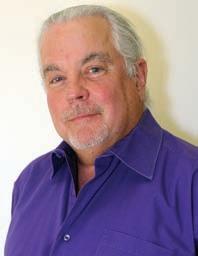
Frank Legato, Editor | flegato@ggbmagazine.com twitter: @FranklySpeakn
Jess Marquez, Managing Editor jmarquez@ggbmagazine.com
Monica Cooley, Art Director mcooley@ggbmagazine.com
Terri Brady, Sales & Marketing Director tbrady@ggbmagazine.com
Becky Kingman-Gros, Chief Operating Officer bkingros@ggbmagazine.com
Lisa Johnson, Communications Advisor lisa@lisajohnsoncommunications.com twitter: @LisaJohnsonPR
Columnists
Frank Fantini | Anton Severin | Rich Sullivan
Contributing Editors
Dave Bontempo twitter: @bontempomedia | Julia Carcamo Keli Elkins | Suzanne Perilloux Leckert
Glenn Light | Allison McCoy | Marjorie Preston Patrick Roberts | Richard Schuetz
Bill Sokolic twitter: @downbeachfilm | Michael Zhu
EDITORIAL ADVISORY BOARD
Rino Armeni, President, Armeni Enterprises
•
Mark A. Birtha, Senior Vice President & General Manager, Hard Rock International
•
Julie Brinkerhoff-Jacobs, President, Lifescapes International
• Nicholas Casiello Jr., Shareholder, Fox Rothschild
• Jeffrey Compton, Publisher, CDC E-Reports twitter: @CDCNewswire
• Dean Macomber, President, Macomber International, Inc.
• Stephen Martino, Vice President & Chief Compliance Officer, MGM Resorts International, twitter: @stephenmartino
• Jim Rafferty, President, Rafferty & Associates
•
Thomas Reilly, Vice President Systems Sales, Scientific Games
• Michael Soll, President, The Innovation Group
• Katherine Spilde, Executive Director, Sycuan Gaming Institute, San Diego State University, twitter: @kspilde
•
Ernie Stevens, Jr., Chairman, National Indian Gaming Association twitter: @NIGA1985
• Roy Student, President, Applied Management Strategies

• David D. Waddell, Partner
Regulatory Management Counselors PC
Casino Connection International LLC. 1000 Nevada Way • Suite 204 • Boulder City, NV 89005 702-248-1565 • 702-248-1567 (fax) www.ggbmagazine.com
The views and opinions expressed by the writers and columnists of GLOBAL GAMING BUSINESS are not necessarily the views of the publisher or editor.
Copyright 2022 Global Gaming Business LLC. Boulder City, NV 89005

GLOBAL GAMING BUSINESS is published monthly by Casino Connection International, LLC. Printed in Nevada, USA.
Postmaster: Send Change of Address forms to: 1000 Nevada Way, Suite 204, Boulder City, NV 89005
4
Official Publication
THE AGENDA
Global Gaming Business DECEMBER 2022 GGB

TRIbal EConomIC DIvERsITy
most financial experts agree that tribes that depend solely upon gaming revenues need to diversify their economy if they want the “seven generations” that they say they are protecting to thrive. A report prepared by Wells Fargo Bank and Boston Consulting Group spells out solutions for economic self-sufficiency for the 574 federally recognized tribes—gaming and in the U.S.
“Tribal communities have been impacted by economic events over the last 20-plus years: 9/11, the great financial crisis, and Covid,” Dawson Her Many Horses, the lead researcher for Wells Fargo, said. “This report was born out of that, reflecting on those experiences and our desire to support our clients and stakeholders in a way that’s meaningful and reflects our expertise in the market.”
One of the major problems for tribes of all sizes is the lack of access to capital. The chart at right demonstrates the few resources tribes can access.

The report provides tribal leaders a framework to think about other economic development opportunities with the profits they make from the casinos.
“It helps them think about other ways they can leverage their assets, to help them withstand the next economic downturn,” Her Many Horses said. “It’s a big report, but we think there’s a lot in it that folks will find useful.”
He hopes private investors will take a look at tribal communities.
“When we look at the banking landscape available for
online measures
online gaming is only legal in six U.S. jurisdictions, but in 2021 it produced more than $3.8 billion in gross gaming revenues. So Eilers & Krejcik launched its Online Game Performance Report, in which it evaluates 29 online gaming sites with a total of 1,780 unique game themes, with 36,565 games tracked each month in five of those states—New Jersey, Pennsylvania, West Virginia, Connecticut and Michigan—representing almost 60 percent of the active market. The chart at right gives a breakdown of the games that are offered by 22 companies across those online casinos. Evolution, which specializes in “live” gaming, has the lead by far, accounting for 27 percent of the total GGR in October 2022. Most of the other major game suppliers come next, and then some online-games-only companies making some progress. To obtain a copy of any Eilers & Krejcik reports, contact Rick Eckert at reckert@ekgamingllc.com.

Capital landscape differs by type, investment range and volume of capital
tribal communities, what we see is that a lot of the financial institutions that are available in mainstream America don’t necessarily go into or have exposure to Native America: venture capital, private equity, regional banks, national banks. You know, there are a lot of banks that just haven’t done much or may not know about opportunities in tribal communities,” Her Many Horses said.
To download a copy of the report, visit wellsfargo.com/com/focus/tribal-economic-report.
Key Insights—GGR & Games Tracked
6 Global Gaming Business DECEMBER 2022
BY THE NUMBERS







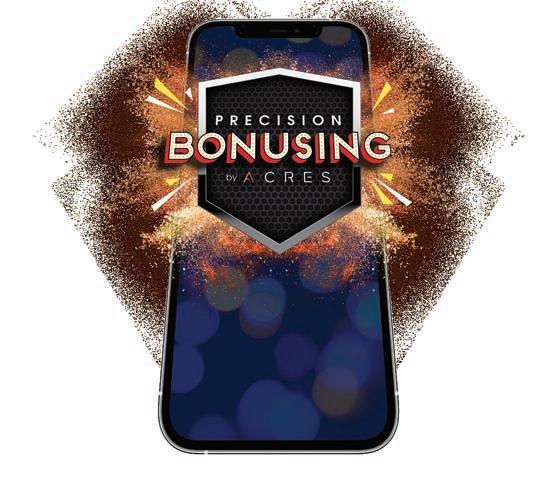


WHERE WE’RE GOING, WE DON’T NEED CASH. TO BOLDLY ANALYZE WHERE NO ONE HAS ANALYZED BEFORE THE BONUSING FORCE IS STRONG WITH THIS ONE. I’M SORRY DAVE, I’M AFRAID I CAN DO THAT. TODAY! For more information visit www.acresmanufacturing.com For a personal demonstration, please email tricia.lee@acresmanufacturing.com
Questions
Harald Neumann
“They Said It”
“It’s very simple for me—it’s about building a sustainable business. We don’t want customers for 10 minutes; we want them for 10 years. No one wants to benefit from others’ misfortune.”
Executive Officer, Ainsworth Game Technology

Chief
Conor Grant, chief executive for the U.K. and Irish Division of Flutter Entertainment, on why the subsidiary Paddy Power is spending more than €100 million annually on safer gaming measures
I


ndustry veteran Harald Neumann was named chief executive officer at Ainsworth Game Technology in September 2021, following a five-year tenure in the same position at Novomatic, Ainsworth’s majority shareholder. Since his appointment, Neumann has been focused on growing the North and Latin American markets, and the company’s historical horse racing (HHR) revolution has been a big part of that growth. Neumann spoke with GGB Editor Frank Legato at the Ainsworth booth at the G2E trade show in October. To hear and view a full podcast version of this interview, visit GGBMagazine.com.

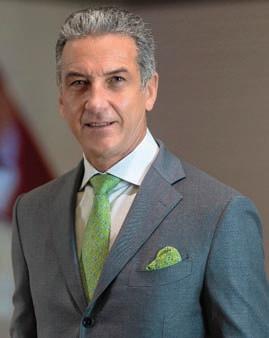
GGB: Let’s start with some of the results—your earnings for fiscal year 2022 are up 38 percent, net income up to $11.8 million. What were the most critical contributors to these results? Neumann: Well, the most critical was that the world recovered from Covid—I think that was the most important one. And of course, our U.S. piece has contributed more than 50 percent of our success; Latin America has recovered, Australia is becoming better and better, so in total, the recovery from Covid and of course our HHR business in the U.S., which also contributed a lot to our profitability.
How important are the Americas for Ainsworth, and what do you do to maintain growth in these markets?
We have defined three key markets for us: No. 1, U.S.; No. 2, Latin America; and No. 3, Australia. So you can see U.S. and Latin America are the first two. The U.S. is the biggest market by far in the casino area—we are quite successful already in the high-denomination area, and we want to increase our installed bases in the low-denomination area, and of course HHR should increase. Latin America is important for us, even though there are always some challenges, like in Mexico with the recent tax increase and smoking ban. But nevertheless, these markets are very important.
How has your commitment to R&D expanded and improved your product roadmap?
When I joined the company, this was priority No. 1, because the company will only survive if we are providing the right games to our clients. We hired a new CTO, David Bollesen, and we have two new studio heads in Vegas and in Australia. All of them are already contributing to our success. We debuted three games at G2E, Treasure Spirits, Ca$h Stacks Gold and Ultra Shot Gold, which are already indicative of the direction Ainsworth is going.
What have been the initial results back from the low-denomination additions? We have already launched the games I mentioned in Sydney, and they are showing quite good results at the Star Sydney. We have had the experience that there’s a high probability that games which are successful in Australia will be successful in the U.S. We’ve really gotten quite positive feedback about the performance of our games, so I believe that we are going in the right direction.
Of course, we have to talk about HHR, where you’ve dominated the space. How have you been able to implement HHR development alongside your traditional offerings?
It’s a new game style in the U.S. which is really performing, and we recently announced an agreement for expansion to Kentucky Downs. Our improved performance in game development will, of course, also have an impact on our HHR games. So, everything is connected together, and as we are not co-developing a game just for HHR or just for Class III, this is connecting the features for both markets. This also brings an added revenue stream because we’re connecting games from Aristocrat, IGT, Konami and so on to our system, which generates added revenue and profitability.
CALENDAR
December 5-7: Global Symposium on Racing, Loews Ventana Canyon Resort, Tucson, Arizona. Produced by the Race Track Industry Program, University of Arizona. For more information, visit rtip.arizona.edu/symposium.
February 7-9: ICE London, ExCeL, London, U.K. Produced by Clarion Gaming. For more information, visit ICELondon.UK.com.
February 28-March 1: Casino & Esports Conference, Alexis Park Hotel, Las Vegas. Produced by Gameacon Events. For more information, visit casinoesportconf.com.
March 7-8: iGaming Next: New York, The Convene-Midtown Manhattan, New York City. Produced by iGaming Next. For more information, visit iGamingNext.com.
March 27-30: Indian Gaming 2023, San Diego Convention Center, San Diego, California. Produced by the Indian Gaming Association. For more information, visit IndianGamingTradeshow.com.
March 29-30: Prague Gaming & TECH Summit ’23, Vienna House Andel’s Prague, Prague, Czech Republic. Produced by Hipther. For more information, visit Hipther.com.
April 19-20: SAGSE LATAM 2023, Buenos Aires Hilton, Buenos Aires, Argentina. Produced by Mongraphie. For more information, visit SAGSELATAM.com.
May 9-11: SBC Summit North America, Meadowlands Exposition Center, East Rutherford, New Jersey. Produced by SBC. For more information, visit SBCEvents.com.
5
8 Global Gaming Business DECEMBER 2022
2
NUTSHELL
1 3 4
5
BLUBERI CLASS OF 2022









JUST WAIT UNTIL NEXT YEAR! FOR MORE INFORMATION VISIT WWW.BLUBERI.COM
Records Fall
As 2022 draws to a close, the gaming industry’s hot streak is showing no signs of slowing down, with annual commercial gaming revenue set to shatter 2021’s record for the highest-grossing year in industry history. Through the first nine months of the year, the industry has generated more than $44 billion in revenue, up nearly 15 percent year-over-year.
What is driving this impressive run in the face of persistent concerns about the health of U.S. consumer budgets? The American Gaming Association’s (AGA) Commercial Gaming Revenue Tracker examines industry trends to answer just that question.
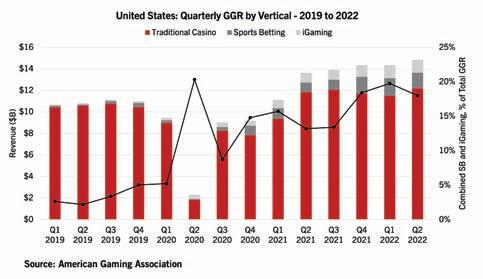
Here are the lessons we learned from our Q3 2022 report.




Record-Breaking Third Quarter
Q3 2022 commercial gaming revenue from brick-and-mortar casino games, sports betting and iGaming set a new single-quarter record, reaching $15.7 billion and topping $15 billion for the first time ever. While the broader U.S. economy expanded at an annual rate of 2.6 percent, gaming revenue accelerated 8.8 percent compared to the same quarter in 2021.
Land-Based Gaming Reaches New Highs
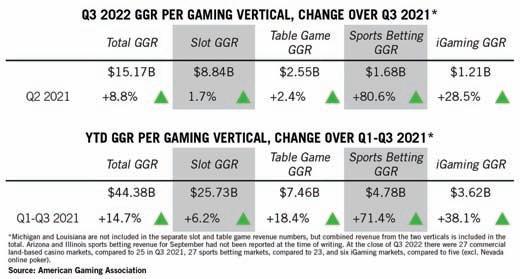
When the factors driving gaming’s record revenue are examined, the spotlight is often directed to the rapid rises of sports betting and iGaming, exciting gaming verticals that are still in their infancy across most of the country.
While sportsbook revenue jumped 80.6 percent year-over-year to a record $1.68 billion and iGaming revenue nearly matched its Q2 2022 record of $1.21 billion, it is still land-based casinos that are driving overall gaming revenue. In the third quarter, land-based casino slot and table games generated an alltime quarterly high of $12.27 billion in revenue, up 1.8 percent year-over-year.
By Anton Severin
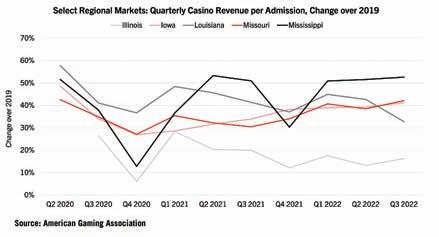
Casino-Goers are Spending More
Americans have yet to return to casinos in the same numbers as before the pandemic, with recent AGA polling indicating that 34 percent of adults visited a casino in the past year (versus 44 percent in 2019 and 28 percent in 2021), but patrons continue to make up the difference through markedly higher spending. In Q3 2022, revenue per casino admission remained well above pre-pandemic levels (37 percent on average) in the states that publish admissions data.
This trend has been a constant over the past two years, as casino-goers, on average, are higher income earners than before the pandemic. According to AGA survey data, 52 percent of past-year casino visitors reported a household income of more than $60,000, compared to 42 percent of all Americans. In 2019, these figures were 42 percent and 38 percent respectively.
Casino Gaming Continues to Expand
Third quarter-land-based gaming revenue was further boosted by the launch of commercial casino gaming in two new states, reflecting strong interest for inperson gaming in new geographies.

On July 8, Virginia became America’s 26th state to launch land-based casino gaming when Hard Rock Bristol opened its doors to the public. The state’s first temporary location grossed $40.3 million in its inaugural quarter of partial operations, outperforming several similarly sized properties in nearby Maryland, Pennsylvania and West Virginia. Subsequently, Nebraska became the 27th state with commercial land-based casino gaming when WarHorse Casino debuted slot gaming on September 24.
Taken together, AGA’s Commercial Gaming Revenue Tracker showcases the continued resiliency of both the U.S. commercial gaming industry and Americans’ demand for gaming. This resiliency will continue to be challenged by future economic headwinds, but what is clear is that the industry is as healthy today as ever.
Anton Severin is director of research for the American Gaming Association. AGA’s Commercial Gaming Revenue Tracker will continue to report on the industry’s performance on a monthly and quarterly basis.
10 Global Gaming Business DECEMBER 2022 AMERICAN GAMING ASSOCIATION
Revenue keeps flowing in to U.S. commercial casinos, but what did we learn?



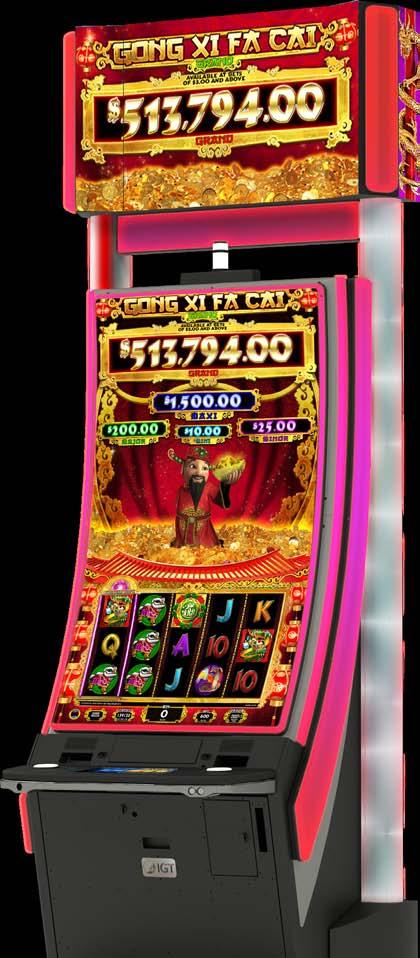


MAKE THE BIGGEST IMPRESSION EILER’S RANKED #1 LARGE FORM FACTOR CABINET © 2022 IGT. All other trademarks used herein are owned by IGT or its affiliates, may not be used without permission, and where indicated with a ®, are registered in the U.S. Patent and Trademark Office. IGT is committed to socially responsible gaming. Our business solutions empower customers to choose parameters and practices that become the foundation of their Responsible Gaming programs. Scan to learn more about the Peak65™ Gaming Machine *EILERS-FANTINI Cabinet Performance Report. Oct. 2022
Opportunities and Challenges
Two diametrically opposed realities confronted casino operators in the third quarter
By

Two themes dominated company comments during the third-quarter earnings report season:
1. Business at casinos is strong and older players, international players and conventions are returning, all boding well for the near-term future.
2. Inflation is starting to have its effects driving up the cost of food and utilities and other expenses, chipping away at the big EBITDA margins that casino companies have so proudly achieved.
Related to those are that games and technology companies continue to enjoy strong support from casino operators, are benefiting from strengthening of their balance sheets and are seeing improvements in supply chains.
However, hovering over these conflicting trends is a Federal Reserve Board of Governors determined to put the brakes on inflation even at the cost of recession.
Casino companies have considerable underlying strengths. They have cut costs. Balance sheets have been strengthened and will be strengthened further. There is plenty of room for revenue growth, whether through existing operations or geographic or physical plant expansions.
But for the foreseeable future, there remains that risk of a Fed-induced recession to worry investors.
And the worry is setting in. Even though stocks ran up fast and far after the latest inflation reports showed modest improvements in trends, both absolute stock prices and valuations are below levels. Whether we are in a bear market punctuated by rallies or whether the worst is behind and it’s upwards from here are arguments for bulls and bears. But the reality is that stock prices as of this writing are still double-digits below their highs.
Regardless of short-term market moves, it is safe to say that if the Fed continues raising rates and scaring off investors and a recession ensues, you can say goodbye to all the sanguine talk about consumers continuing to spend. They won’t. Even without recession, there is mounting evidence that the cash hordes consumers built with Covid relief money are finally nearing depletion and will not be there to finance gambling jaunts.
Sprinkle in higher prices and less discretionary
income and the outlook for entertainment companies dims into a world of stagflation. Go past stagflation to full recession and the result for consumer discretionary companies is the same.
And weaker economic conditions will bring lower earnings followed, of course, by lower stock prices likely compounded by tumbling valuations.
If that scenario comes to pass it will spell for long-term investors two enticing words: buying opportunity.
could finally say debt ratios are under control. They and Aristocrat could point to continuing improvement in their business fundamentals. Everi and Inspired Entertainment continued to develop in ways that promise to deliver impressive compounded profitable growth, each with its own special kicker, cashless gaming for Everi and virtual sports for Inspired. All are growing their digital businesses as they develop from casino suppliers into cross-platform games providers.
So, while casinos and sports betting companies grab the attention, investors might do well to look at the engines under the industry’s hood that make it all go.
Now, Macau
Readers of this space are accustomed to my warnings about investing in Macau casino operators. And, for those keeping score, my bearish stance has proven correct, big time.
But conditions change, and now is the time to consider buying the stocks, and especially those of the U.S. listed companies—Las Vegas Sands, Melco Entertainment, MGM Resorts and Wynn.
The underlying strengths of today’s casino companies and their still-to-fulfill business opportunities will remain regardless of inflation, recession or bear markets.
And if history repeats, the road back to higher stock prices will begin before the economy recovers, so any investors waiting for the all-clear signal will miss the big upturn.
In short, now and the near future should be good times for long-term gaming investors to be buyers.
Supplying Optimism
Casino companies make the headlines in the financial press. Everyone can visualize the main floor of a casino, a table game pit, the crowds and bright lights of the Las Vegas Strip.
But the real story of gaming in 2022 might be the health and prospects of the supplier companies.
Everyone, it seems, had a positive tale to tell in their third-quarter announcements.
Big players from IGT to little guys like AGS beat expectations. Companies such as Light & Wonder
Macau casinos may never return to the revenue levels of several years ago. In fact, I doubt that they will, given the Chinese Communist Party’s antipathy towards gambling.
But the national Chinese government also is not about to crush Macau’s economy and, for the foreseeable future, that economy depends on the health of its casino industry.
Travel will soon resume to Macau from mainland China and revenues should grow substantially over the next year, taking stock prices with them. That should present a significant trading opportunity. Note, I said trading opportunity, not investment opportunity. Those believing the long-term bullish story for Macau gambling risk being burned by that Communist antipathy.
Of course, this depends on one big caveat—the renewal of gaming concessions. We’ll know the answer to that soon enough, with current betting that they will be renewed.
Frank Fantini is principal at Fantini Advisors, investors and consultants with a focus on gaming.
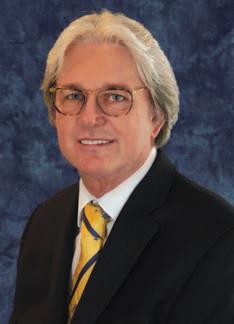
12 Global Gaming Business DECEMBER 2022
FANTINI’S FINANCE
Frank Fantini
It is safe to say that if the Fed continues raising rates and scaring off investors and a recession ensues, you can say goodbye to all the sanguine talk about consumers continuing to spend.
”
“
AGEM update
AGEM Member Profiles
Silver Member Profile Zitro globalzitro.com
Zitro’s strong focus on research, development and innovation of products has led the company to become a global leading supplier of video slot and video bingo games in addition to its commitment to give greater prominence to the online market.

Bronze Member Profile Competition Interactive competitioninteractive.com
Competition Interactive is a licensed gaming manufacturer born from the love of game design and the passion of evolving the casino gaming experience. Their strong team brings years of experience to provide the gaming industry with next-gen fun and engaging casino and iGaming products.

Associate Member Profile Butler Snow LLP butlersnow.com
AGEM November 2022 Meeting Recap

• AGEM will host Nevada Gaming Control Board member Brittnie Watkins and Technology Division Chief Jim Barbee at the next monthly gathering on December 13. In addition to a discussion with GCB Technology on general industry issues, this will also be prior to the Nevada Gaming Commission agenda on December 22, where proposed Regulation 5 provisions surrounding cybersecurity will be discussed and considered. AGEM, through its Compliance Committee and outside counsel, is preparing a response and comments on the proposed regulations. Members are also invited to provide additional information that may assist with AGEM’s response to ensure that supplier considerations are identified and considered.
• G2E 2022 was recently completed and deemed to be a successful show by exhibitors and visitors alike. Korbi Carrison, G2E event director, gave a recap of the show at the recent monthly meeting. Total attendance is thought to be 25,000, a number which is just shy of 2019 figures; however, the data is still being analyzed with final figures not yet verified. The G2E educational panels were particularly well attended with higher-than-expected numbers and in some cases, all seats taken with standing room only. The focus now is to build on the success of this year’s show by evaluating all the feedback to determine what worked, what didn’t, and how they can continue to improve to make G2E the best show.
• For the past few months, the AGEM Compliance Committee has been putting together information to present to the Pennsylvania Gaming Control Board to improve the process of game/product approvals. Currently, some of the processes through the lab are quite cumbersome due to the regulations not keeping up with the fast pace of technology progress. AGEM members have been invited to provide information highlighting some of the more common issues that can be presented to the agency for discussion in hopes of finding a more efficient process for all parties.
Forthcoming Events
• AGEM is supporting the National Black Caucus of State Legislators Conference November 30December 3 in Las Vegas by sponsoring a cocktail reception during the event.
• The AGEM McMonigle Cup Golf Tournament takes place at Bear’s Best Las Vegas on December
6. Open to all members, the event will consist of 20 two-person teams and will conclude with a barbecue lunch and prize-giving.
• The National Conference of Legislators from Gaming States Winter Meeting takes place December 8-11 in Las Vegas. AGEM will be a sponsor of this important legislator event with Executive Director Daron Dorsey and Director of Responsible Gaming Connie Jones taking part in various events and panels during the conference.
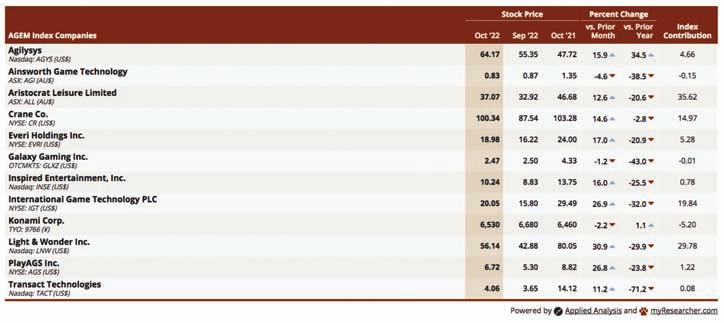
• The next AGEM Board of Directors/Voting Member meeting will be held on December 15.
AGEM index
Butler Snow LLP is a full-service law firm with a network of attorneys, advisers and staff collaborating across a network of more than 25 offices in the United States, Europe and Asia, allowing clients to benefit from strategic counsel, efficient execution and innovative solutions to complex challenges.
AGEM is an international trade association representing manufacturers of electronic gaming devices, systems, lotteries and components for the gaming industry. The association works to further the interests of gaming equipment manufacturers throughout the world. Through political action, trade show partnerships, information dissemination and good corporate citizenship, the members of AGEM work together to create benefits for every company within the organization. Together, AGEM and its member organizations have assisted regulatory commissions and participated in the legislative process to solve problems and create a positive business environment.
The AGEM Index increased by 106.87 points in October 2022 to 846.64, a 14.4 percent improvement from the prior month. Compared to one year ago, the index was down 231.28 points, or 21.5 percent. The latest period marked the first month-over-month increase following a two-consecutive-month skid. During the latest month, nine of the 12 AGEM Index companies reported stock price increases, resulting in nine positive contributions to the AGEM Index and three negative contributions. The largest positive contributor to the monthly index was Aristocrat Leisure Limited (ASX: ALL), whose 12.6 percent increase in stock price led to a 35.62-point gain to the index. Light & Wonder Inc. (Nasdaq: LNW) contributed a 29.78-point increase to the index as the result of a 30.9 percent increase in its stock price. The largest negative contribution to the index was sourced to Konami Corp. (TYO: 9766), whose 2.3 percent decrease in stock price resulted in a 5.2-point loss for the AGEM Index. All three major U.S. stock indices saw month-over-month increases in October 2022. The Dow Jones Industrial Average increased by 13.9 percent from September, while the S&P 500 grew by 8 percent. Meanwhile, the NASDAQ rose 3.9 percent over the month.
DECEMBER 2022 www.ggbmagazine.com 13
Doing the Math
By Frank Legato
what keeps players at the game—the program math
Fifty years ago, the math of the slot machine was a simple proposition. Three reels, 64 stops per reel, and no special features outside of perhaps a wild symbol. The functions of game design and program math were usually relegated to one person.
The virtual reel system that came in the 1980s changed everything, of course, with an unlimited number of virtual stops at the game designer’s fingertips. Still, things remained relatively simple, at least until Australian-style multi-line games and bonus features debuted in the mid-1990s. With more possible outcomes to every spin, program math gained an importance it did not previously have.
These days, mathematicians are essential to game design. They take creative concepts that present a multitude of outcomes, and features from holdand-re-spin to wheel bonuses to multiple progressive jackpots, and weave them into game programs that keep players playing while making money for the casinos.
“Math is critical,” says Michael Brennan, chief product officer for slot supplier Bluberi. “In the simplest terms, the old adage of ‘the art gets the player to stop and try your game, but the math keeps them there (and keeps them coming back)’ really does ring true today more than ever.”
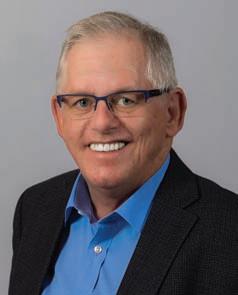


“Game math is the foundation of the game,” notes Gerard Crosby, senior vice president and chief games product officer for Konami Gaming. “The game designer works closely with the mathematician creating a compelling math model, then works with a small team of artists, engineers and composers, developing the game vision, ensuring the player chases are transparent and fun to play.”
Other suppliers sing a similar tune when it comes to the importance of math in the game design equation. “The combination of math and art is extremely important to any slot product,” says Ainsworth’s Andrew DuBose, a game designer who also holds an M.S. in mathematics. “We are always trying to meet the players’ needs and expectations
during game play.”
Ainsworth Lead Game Designer Terry Daly, a 30-year veteran of the craft, digs down deeper, noting that math is what governs the game style. “A gambler-style game will have a low win frequency, but higher pays,” he says. “An entertainment-style game will have more frequent bonuses, but lower pays. It’s important to determine what you are trying to accomplish with each game. You are really trying to reach two audiences. There are players who have more time than money and other players who have more money than time. We need to appeal to both on casino floors.”
“Konami’s math is targeted toward the gambler player type, and game themes tend toward the styles sought out by that type of gambler,” says Ian Arrowsmith, senior director of game development for Konami Gaming. Michael Mastropietro, senior vice president of game development for Light & Wonder, says, “To achieve successful game design, mathematicians, game companies and designers must embrace the idea that math is the soul of the game. The experience of the game and the excitement behind each moment is driven by math. When you mesh these two elements together—creativity and mathematical function—you achieve a balance that not only is functional for the casino but is also excitable for the player.”
14 Global Gaming Business DECEMBER 2022
“You are really trying to reach two audiences. There are players who have more time than money and other players who have more money than time. We need to appeal to both on casino floors.”
—Terry Daly, Lead Game Designer, Ainsworth
Anthony Baerlocher, vice president, innovation and mechanical reels for IGT, puts it succinctly: “To me, the math is the personality of a game,” he says. “Different people are attracted to different types of games and game math. The math itself is complicated, but it is a science. It is true, it is accurate. But there is an infinite number of permutations on how to get to a 95 percent payout. That’s where the creative process comes in—building the pay loading, the frequencies, how much goes into a bonus that creates that game’s unique personality.”
Signature Style
Those “unique personalities” of games have allowed each supplier to develop a signature style—game characteristics that players recognize as the product of a particular manufacturer.
“We do think we’re evolving a signature Bluberi approach,” comments Brennan. “Can we take the final game math and simply re-present key events and mechanics to the player to add variety, depth, and re-playability without affecting the core math pillars?
“For example, if you spin a wheel to win a multiplier, why not, for a less frequent subset of this occurrence, present the multiplier first then recreate the wheel spin experience? This is a method we used to great success in Devil’s Lock and are repeating with upcoming releases.”
“Ainsworth’s high-denom math models have been some of Ainsworth’s signature game styles,” says Daly. “That’s a much different math style than a traditional three-reel game or a five-reel low-denom game. It’s all about appealing to different players.”
“All mathematicians have what we’d consider a style or fingerprint to the designs we put out,” says L&W’s Mastropietro. “This signature fingerprint is woven consistently throughout studio outputs.”
Tweaking the math while keeping a signature style is particularly important in the case of recurring game themes. “When it comes to building game families, you typically have math models that stay consistent and then iterate the creative,” says Mark DeDeaux, general manager and senior vice president, slots for AGS. “As an example, with the game Rakin’ Bacon!, we have certain standards within the game to make sure they are always present. When we make sequels, there are certain items we never want to depart too far away from, like the base mechanics, because players have certain expectations of the game.”
“For game families, we try to keep jackpot and feature hit rates the same,” says Ainsworth’s DuBose. “On all our three-reel games the jackpot
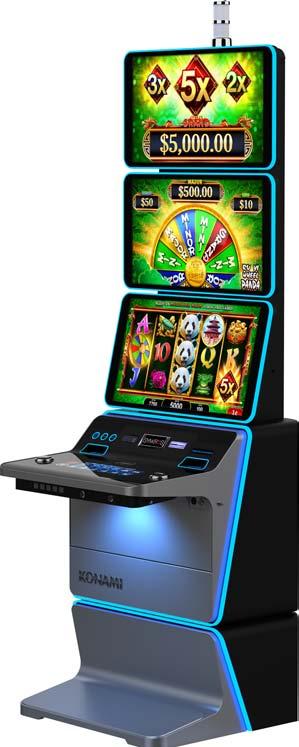
frequency will be similar. The math changes may be more subtle in line pays or adjusting other frequencies of events that players will want to chase.”
“Thinking back to many of our game families,” says Mastropietro at L&W, “you’ll see various iterations of the game, and with each new addition to the family, there’s something that makes it more compelling for the player. We look to take the fun parts of the game that really draw in the attention span and excitement and give them a plus-up.
“For example, our Dancing Drums began with the feature play of drums growing up to six stacked, but when we released Dancing Drums Explosion, we thought, ‘OK, how can we one-up this for the player?’ and that’s where we decided the drums now would grow to stack eight high.”
One theme that has maintained its signature style throughout the past 25 years and scores of individual titles is the Wheel of Fortune franchise from IGT.

“There are certain functionalities that are combined with the wheel and frequency of the wheel that have fulfilled play expectations over so many years,” says Dubravka Burda, senior vice president, global studios for IGT. “We evolved the math over the years, but the functionality, the color, and the parts in the game are very consistent. This is something that is definitely IGT’s signature.”
The Basic Process
As more and more diverse game features have been added, game design has become more complex over the years, as all those features and outcomes must be woven into an effective math program. However, the basic process of game development has remained as a joint effort of creative design and mathematics.
“Essentially the whole process hasn’t changed at all in the fact that you’re aiming to create an experience that is going to get the player excited to pursue a win and want to play the game each time they visit a casino,” says Ainsworth’s Daly. “What has changed is the technology. The math is much more complex. We can really drill down into how players interact with the game.
“Additionally, the math modeling is much more flexible. In older games, especially old mechanical games, you could get very limited in what
DECEMBER 2022 www.ggbmagazine.com 15
“Game math is the foundation of the game. The game designer works closely with the mathematician creating a compelling math model, then works with a small team of artists, engineers and composers, developing the game vision, ensuring the player chases are transparent and fun to play.”
—Gerard Crosby, Senior Vice President and Chief Games Product Officer, Konami Gaming
you were able to execute. To put it simply, the power of microprocessors today is infinitely more powerful than anything that was available in the past. The ability to use graphics to reflect the math has obvious changed significantly over the years. You can do things today that would have been unfathomable 20 years ago.”
“Great game ideas come in all different shapes and forms,” says DeDeaux at AGS. “Sometimes it’s iterating off of mechanics we are familiar with in the market and building math models that accentuate the game. It starts with the concept of a game and simultaneously, graphics, art and math come together to complement it. We identify what we want to achieve and have ongoing development and iterations of it to get there.”
“Concept first, then we assign a math model,” explains Martin Blais, mathematician manager for Bluberi. “And it all has to gel, following our cornerstone design principle of ensuring everything is ‘where it matters.’ Big animations should coincide with significant math contributions, for example.”

DuBose at Ainsworth comments that effective game design is a process that can take many forms. “In the recently released Grand Legacy and Royal Legacy, we thought we had a good game theme and wanted to incorporate some ideas like larger multipliers and the chance to win multiple jackpots on a single spin,” he says. “We sat on it for bit until we were able to come up with the right math for the game.”
“Konami’s R&D works closely with product management to determine the business and market needs with respect to all the different types of games required,” says Arrowsmith. “The game designer usually has an idea of the type of game they want to make. They then work with both math and art to come up with an initial concept, with the math and art complementing each other, to produce an awesome game.”
What has changed in this process is the complexity of the games themselves, according to Konami’s Crosby. “The games have become more complex as more and more exciting new free game and bonus features are included,” Crosby says, “and thus, product technical documents have grown to be the size of a large novel, and simulations of the math models have become a critical part of the math design process.
“Also, the design of the math model is much more collaborative between mathematician and game designer to ensure the best playing experience is achieved. Wizard Strike is a perfect example of this, where mathematician
and designer worked hand-in-hand to produce this compelling model.”
“Games used to be pretty simple, but they’ve grown significantly in complexity,” says Blais at Bluberi. “The role of a mathematician has also evolved, where today a strong mathematician needs to be versatile—he or she has to know some programming, for example.”
“Back in the day when it was three reel, one-line stepper, it was here’s a math idea first,” says IGT’s Baerlocher. “That’s inverted in today’s world. It’s really more about coming up with the concept and then making sure that the math fits. And then what we see happening is the math actually adapts to the original concept. If we find it doesn’t play the way it was originally envisioned, we make modifications so that the concept and the math work hand in hand.”
“Game math is fairly finite,” says DeDeaux at AGS. “You may have a game concept that is creative in the types of bonuses you want to do, but adapting the game math to the game is challenging, and takes a lot of creativity and finesse to have the exact outcome mathematically in the bonus, features, and base game. It requires a lot of art, science, and being creative in solving challenges.”
Into the Future
Those challenges will no doubt increase as the creative teams at the slot suppliers come up with more innovative concepts and new ways to play.


“One thing that is certain is that games will become more complex in the future,” says DeDeaux at AGS. “As an industry, we will face the challenge of entertaining and capturing the younger demographic. When you look at how tech has evolved, and the types of entertainment experiences offered on cellphones, we will need to think about how we can compete with future technology, in general, to continue moving forward as an industry.”
IGT’s Baerlocher sees the challenges of game design evolving as more information becomes available on player preferences. “The big thing I see changing in the industry is the availability of data,” he says. “It used to be really hard to get any type of information out of the casino industry on how games were performing, but in the past four or five years, operators are being more open to sharing data because they realize that by giving the suppliers some insights, they’re going to get a better product.
“With information like the Eilers report and ReelMetrics that shows which games are the top earners, you can spend more time studying those games and learning from them... using data to help our creativity.”
“I like to use the analogy that building a game is like building a great (music) album,” says DeDeaux at AGS. “You need lyrics, your music, and all the different elements to create one. But it’s the combination of all these things working harmoniously together that makes it great.
“Math is like the heartbeat of a game, similar to how the rhythm is the heartbeat of a song—and it is critical to the overall success of the game.”
16 Global Gaming Business DECEMBER 2022
“The combination of math and art is extremely important to any slot product.”
—Andrew DuBose, Game Designer, Ainsworth

Back to Basics
pandemic
Last year, the top trend identified by the editorial advisory board of GGB was the recovery from the pandemic. Yes, following the shutdowns of 2020, 2021 was an improvement, but in 2022 the pandemic was clearly in our rearview mirror. The gaming industry produced record revenues in 2022 as players relieved that pent-up demand that had been building up since the introduction of Covid. So things were good.

Now, 2023 will certainly have its challenges, most notably the soaring inflation and economic malaise that has already begun in the second half of 2022. But the overhang of Covid is gone, at least in most of the world outside of southeast Asia. The Chinese zeroCovid policies are affecting all the jurisdictions that depend on Chinese travelers, so there’s no telling when or if that policy will be relaxed.
But for the rest of us? It’s back to “normal,” or whatever that is in the wake of the pandemic. But possibly because of the clouds that hang over the general economy, the trends for ’23 weren’t that clear. Is sports betting really doing the most it can for the gaming business? If so, what happened in California? Can I bet on the next pitch? How is casino marketing changing now that the next generation is in play? If Macau is hurting, who’s getting that business and why? How is slot theory evolving for new players? Esports betting getting closer? What’s so great about sustainability? And when it comes to new venues, when can we look to Texas? If it’s taken years to get over the hurdles in Japan and Brazil, what makes us think that it will be easier in Europe?
So learn what to look for in 2023, but you’d better look fast. It may not last long.
1

Island Fever
Europe’s first integrated resort will open in 2023 and may spur a quickening of the pace for others

The Cordish Companies are part of a massive development in the town of Torres de Alameda near Madrid
Integrated resorts are a proven success wherever they are built. The U.S., Australia, and many countries in Asia can attest to their ability to create employment, generate massive tax revenues and increase tourism in quantity and quality. Why, then, have there been no IRs built in Europe, a continent that could surely appreciate those benefits? There have been no shortage of proposals, with many European countries floating the idea, but it has never come to fruition.
Why? The answer is often convoluted and includes politics, corruption, tradition, and often a lack of commitment to the process.

But all that is about to change in 2023. The first European IR will open in Cyprus. It’s been a fiveyear effort, and the Asian gaming company, Melco Resorts & Entertainment, is poised to open City of Dreams Mediterranean in the second quarter of the year.
Even before opening, COD Mediterranean seems to have reawoken interest in IRs in other countries. In Greece, a plan to create a master community at the former Hellinikon airport that includes an in-
City of Dreams Mediterranean
Total size of site:
• 36.7 hectares (88 acres)
• 86,000 square meters (282,000 square feet)
• A 14-story hotel tower with 500 guest rooms and exclusive suites
• 9 world-class restaurants and bars
• Retail area inspired by the streetscape of the old Nicosia
• 7,500-square-meter gaming area with over 100 tables and 1,000 state-of-the-art slot machines
• Over 9,600 square meters of expo, ballroom, convention, meeting and pre-function areas
• Spa and fitness facilities
• Sports and leisure facilities, including a seven-a-side football pitch, tennis court, squash court and jogging trails
• Indoor and outdoor swimming pools and landscape gardens
• 200-seat amphitheater and terraced lawn for live outdoor entertainment
• A family adventure park
18 Global Gaming Business DECEMBER 2022
Location: Zakaki, Western Limassol
The 10 Trends for 2023 do NOT start with the recovery from the
tegrated resort appears to be moving forward. Hard Rock International is the partner (replacing Mohegan Sun) with the GEK TERNA Group and construction is under way for a possible 2026 opening. The property promises a five-star hotel, premier convention and meeting space, a large entertainment component, world-class food and beverage and unique outdoor spaces.
In Spain, the Cordish Companies, known for its “Live!” gaming and nongaming developments in the U.S., has reached an agreement with the small town of Torres de Alameda, east of Madrid.
The mayor of Torres de Alameda, Carlos Sáez, is fully behind the project, which will feature a variety of attractions including several smaller casinos, hotels, shopping areas, meeting and convention space, restaurants and much more. Sáez insists that Cordish is “in love” with the town and fully committed to the project.
But it will take more than the approval of the mayor of Torres de Alameda; it will require the OK from the Community of Madrid, a regional organization that rejected the first Cordish proposal for “EuroVegas” in 2017 because it was too “American” and failed to promote the Spanish culture. Cordish is hoping this time will be different with one of the attractions being the world’s largest flamenco table. The project will cost an estimated $2.36 billion with profits of over $4 billion projected within the first five years.
But with no timeline, the Melco project will get a long head start.

Grant Johnson, the property general manager for City of Dreams Mediterranean and Cyprus Casinos, tells GGB he thinks the company’s relations with the Cyprus government was the reason Melco was chosen.

“It takes a unique set of circumstances to make an integrated resort happen,” Johnson says. “Melco is always looking for growth opportunities, and I think in Cyprus, we finally found an opportunity where it was a destination that had a good base of tourism with a good location and potential to grow that tourism number. And more importantly, Cyprus was a government that seemed very interested to bring an integrated resort to the market.
“Europe is a complicated place with lengthy and complex regulatory processes, and it was a long time coming for this type of integrated resort, but it was a good match between our objectives and Cyprus.”
Johnson explains that Cyprus was looking to upgrade and increase its visibility by approving an IR.
“Cyprus has a small population of 900,000 and competes with the tourism offerings of the Mediterranean—Greece and the islands off Greece, Southern France and Italy, and other places,” he says. “I think Cyprus is under-recognized. So they were looking to put themselves on the map a bit more for its blue water, beautiful beaches, 320 days of sun, and a mix of various cultures. There are Roman, Greek and Turkish influences. So it’s a unique place, and I think they were looking for new ways to help market themselves. And the integrated
resort will do that.”
One of the issues Cyprus wanted to address was an expansion of the season, according to Johnson.
“It’s very much a summer market,” he says, “a seasonal market. So they were really looking to make us a year-round destination. With an integrated resort, you bring in the MICE business in the winter, alternative entertainment, and we’ll fill this place with content. It just enhances the offering.”
Four years ago, Melco began to open satellite casinos across the Republic of Cyprus, and four are open today. Johnson says they’re typical “locals” casinos.
“It’s a very much core local clientele of repeat visitation,” he says, “a nice base of business that we can start with here, but we need to grow that international space as we go. There were no casinos here prior to us operating in the Republic of Cyprus. There’s some in the north of Turkish-occupied Cyprus, but we had to basically build up a local casino operation team. We hired almost all of our dealers locally and trained locally. They will move up to supervisors when COD Mediterranean opens.”
As for that international visitation, Johnson says it will rely heavily on Israel and the surrounding Gulf states.
“In the summers there are 30 flights a week from Israel,” he says. “And that drops down to about 10 per week in the winter months. And then you go to the Gulf countries, which are also big for us. So the Gulf countries, and then Pan Europe and sprinkle a little bit of North Africa in there as well. And then we’ll see what happens with the conflict in Ukraine. Russia used to account for about 20 percent of the visitation to Cyprus. Not so much anymore, but longer term as Russia comes back, I think that will be in the mix as well.”
Another target for Melco is the tour operators who run excursions throughout the Greek Islands over the summer season. Johnson says extending these relationships is a priority for COD Mediterranean.
“We hope to work with over 90 tour operators by the time we open; we’re slowly starting to sign contracts,” he says. “There’s an existing tour operator business that now we’re tapping into. We think our product adds to this. We’re now going back and having to be a bit more aggressive with our partnerships and to push a little bit more on the off season, because that’s something where traditionally the tour operators haven’t come to Cyprus. So that’s where the Ministry ofTourism gets involved, and it’s working with the airlines together with tour operators and trying to develop off-season content.”
Melco made a commitment to the government to first hire Cyprus citizens, and Johnson says they are fulfilling that commitment. But he also notes that they’ve had to reach farther afield to fill some positions.
“We have 700 colleagues now that are employed through our satellite operations but we’re hiring another 1,800 as we get to COD Mediterranean,” he explains. “And we’re struggling, to be honest, to find enough locals within Cyprus, which is our priority. So we’re looking now across Europe and even non-EU countries.”
Johnson is confident not only that they’ll be well staffed for the opening, but that the Melco corporate culture will keep them engaged.
“As you know, that’s in our DNA, and it starts with (CEO Lawrence Ho) and then trickles down to all of us. Melco has always been a global leader in hospitality with service, and we just moved it to Cyprus and applied it here. There are some adjustments, of course, as you get into a local market because you want to adapt to the local culture. But that’s really our strength as we come in, because there are probably hundreds of hotels throughout Cyprus, but what we’re bringing is the Melco global standard of hospitality.
“We’ve got 96 Forbes stars, and I forget how many Michelin stars we have now, but they are special here, and that’s actually helping us recruit.”
—Roger Gros
DECEMBER 2022 www.ggbmagazine.com 19
The Hard-Rock Hotel Casino Hellinikon Athens
The Philippine Casino Gaming Market
An exemplary case of competitive factors driving market recovery and growth in a post-Covid era
While the profound impacts of the Covid-19 pandemic continue to linger in many Asia Pacific gaming markets, the Philippine casino industry has been leading the region’s recovery and displaying signs of growth. The following examines how diversification and other key market advantages provides an exemplary case for post-Covid era gaming across Asia.
Land-based casino gaming in the Philippines was legalized in 1976. Since then, the industry has grown steadily over the past few decades (except during the pandemic-affected years) and has successfully secured its position among the top three gaming markets in Asia. From 2012 to 2019, the market’s gross gaming revenue (GGR) grew at a compound annual growth rate (CAGR) of more than 17 percent to achieve a record GGR of PHP 216.4 billion in 2019, more than three times the GGR in 2012.
Casino Gaming GGR in the Philippines (PHP in billions)
What is fueling the recovery and growth of the Philippine casino market? Our analysis indicates that the critical drivers include diversified product offerings, well-balanced market segments, expanding and enhanced capacity, an advantageous gaming tax regime, a solid workforce available at competitive costs, and the agglomeration of high-quality integrated resorts (IRs) in the country.
Diversification
The Entertainment City district in Metro Manila, the pride of the country, is a truly remarkable example of casino gaming and diversified leisure activities. Home to a number of prominent world-class resort complexes, the area provides a wide range of lodging, gaming, and other entertainment offerings. Moreover, Entertainment City arguably represents one of the world’s top IR clusters, along with the Las Vegas Strip and the Cotai Strip in Macau.
While these destinations have varying degrees of dependency on gambling, the agglomeration of casino facilities has undoubtedly shaped all three into top tourist destinations. The resulting “cluster effect” is expected to drive a strong and sustainable increase in future gaming and tourism demand.
The country’s anchor destination, Entertainment City, is complemented by other notable casino resort areas in Cebu and Clark. Cebu, a significant tourism destination and the second largest metropolitan area (after Metro Manila) in the Philippines, recently welcomed a new five-star IR, NUSTAR Resort and Casino, with Emerald Bay Resort and Casino expected to open next year.
The Clark Freeport Zone, a redevelopment of the former U.S. air base about 50 miles north of Metro Manila, is home to multiple high-quality gaming and hospitality properties. The upward dynamics in these markets unequivocally endorse the importance of diversification in terms of product offerings, source markets and beyond, which had been emphasized by many before the pandemic and have become even more critical in the post-Covid era.
During 2020 and 2021, the market was severely impacted by protective measures instituted to curb the global pandemic, including closures, lockdowns, capacity limits and other restrictions. Nevertheless, the Philippine market’s GGR in the first half of 2022 has demonstrated a strong rebound with the recovery pace expected to accelerate—the 2022 total GGR estimate is anticipated to exceed the 2018 level and to reach nearly 90 percent of the 2019 level.

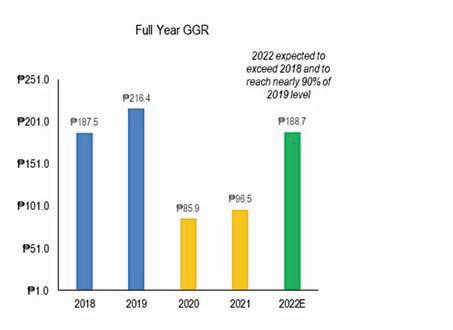
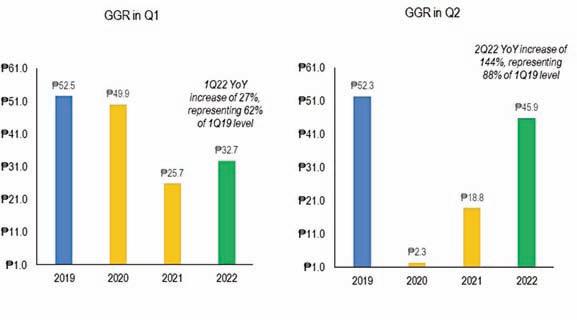
Visitation
Fueled by solid local market segments and gradually increasing international visitation, the Philippine gaming market has been able to achieve substantial progress since early 2022. Within the current Asian gaming landscape, one of the most noticeable ongoing changes is the shift of junket-channeled VIP play
Solid Recovery Beginning in Q2 2022 (PHP in billions)
20 Global Gaming Business DECEMBER 2022
2
Source: PAGCOR, The Innovation Group
Source: Philippine Amusement and Gaming Corporation (PAGCOR)
to mass-oriented business. While it is true that mass gaming tends to yield a relatively higher profit margin than VIP business, it is important to not overlook the infrastructure and capacity required to handle the volume of mass visitation necessary to offset the decrease in premium business and achieve future growth. The Philippine market fills another exemplary role in this context.
Infrastructure improvements in the Philippines, ranging from enhanced connectivity between Manila and the neighboring regions to the newly added terminals at airports in Clark and Cebu, are expected to facilitate rapid recovery and further growth of the country’s gaming industry. The Clark International Airport’s new 10,000-square-meter terminal can accommodate approximately 8 million additional passengers per year. In addition to providing a more efficient gateway into Clark, it also is intended to ease air traffic congestion at Manila’s Ninoy Aquino International Airport.
Workforce
Further to above, one challenge that surfaced during the pandemic and continues to linger is the availability of a quality workforce. Shortages in skilled labor have hindered recovery and growth pace of economic activities around the world, and have been especially challenging for service industries like gaming. Mass gaming requires a larger workforce of quality, skill and reliability, which is likely to challenge many operators in the region’s gaming markets.
The Philippines possess another competitive advantage in this area. The local workforce tends to be comprised of fast learners who have the passion to work in most entertainment and hospitality settings. Meanwhile, labor costs in the Philippines remain among the most competitive in the ASEAN countries, at-
tracting foreign investments and new operations to the country.
Taxation
Gaming tax rates and structure can have a significant impact on the potential success of an IR development and the acceptable return on private investment. Implementing a tax structure that attracts optimal capital investment while still deriving adequate revenue through taxes and providing ample funding for tourism promotion, regulatory oversight, and other associated social needs is critical.
The Philippines’ gaming tax regime remains commercially competitive in the Asia Pacific region, which represents a solid competitive advantage of the market, as operators can allocate more financial resources towards customer acquisition and/or capital improvements that result in greater prospective revenues.
While macroeconomic conditions and geopolitics between the Philippines and its key feeder markets may impose challenges in the years ahead, on balance, the Philippines gaming market is expected to grow in a sustainable manner thanks to its major business drivers and competitive advantages. The Philippine market already has set an exemplary case for the industry in the Asia Pacific region to evolve in a post-Covid era and will continue to build on that by capitalizing on the booming, and increasingly wealthy, middle class in the region, and better stimulating tourism and related economic impacts that benefit the country. —Michael Zhu is senior vice president, international operations planning and analysis for The Innovation Group.

The Holy Grail
Microbetting will produce more revenue for sportsbooks, but how will it be promoted?
Critical mass has always been the key to success for sports betting. If you can only make a few wagers on the results of the entire game/match, you might as well be betting the horses. And we know that horse racing is a dying sport for that exact reason. They haven’t figured out how to allow betting at the quarter pole or any other length of the race, or even of the margin of victory, so the win-place-show and all the attendant parlays is about it.
While sports betting has a few more results-driven wagers available, the real prize is figuring out how to bet in-game or in-running, whatever it’s called. When you could predict whether the next pitch will be a strike or a ball, or even a fastball versus a curveball, you’ve drilled down. When you have analytics to place accurate odds on whether the next play will be a run or a pass, you’ve got something. Or if you could take a flyer on whether the basketball team will run a play resulting in a layup or a 3-point shot, you might be building something strong.

So far, in-game wagering hasn’t taken off in the U.S. Much of it could be the result of lagging technology. Either the operator doesn’t trust the technology to offer in-game betting or the player gets frustrated with the lag time between deciding to make the bet and actually pulling the trigger. Seems that more often than not, the odds change dramatically in the other direction or the bet gets taken off the board. It’s frustrating for both parties.
In addition, in-gaming betting is largely limited to the shifting odds on the results of the entire game. For example, in soccer, if a team that started the game at +200 scores the first goal, the odds of them winning the game probably drops to even money or even -120, given the paucity of scoring in many soccer matches. But try to find a bet that predicts which team will make the next turnover. In most cases, the U.S. for sure, it won’t be there.
But there are dozens of companies in pursuit of the “holy grail,” and the ones that succeed will do very well. SimpleBet is a company that is a contender. Mark Nerenberg, the company’s chief commercial officer, explains why it’s important to understand the dynamics between this “micro time frame in-play betting.” While he says that this kind of wagering hasn’t been that prominent in the European sports betting community, he believes it will be different in the U.S. “because of the cadence of the U.S. sports and the significance of these micro events within the sports.”
The microbettor will have a chance to wager whether Aaron Judge will hit a home run while he’s in the on-deck circle, or even when he’s down 0-2, when the odds will soar against him hitting it out

He says that there is always significant time to place bets on these micro events, and that those events are already highly recognized by fans.
“They have opinions on whether one team is going to stop the other on third-and-one, or whether the next hitter will be able to deliver in the clutch,” he says. “Those things are already ingrained in the U.S. sports.”
Nerenberg says the technical expertise compiled by SimpleBet over the past three years has made a huge difference.

“When you’re taking these microbets, you have to know the exact state of the game at all times,” he says. “We got very good at defensive logic, where we identified all these situations that we know would be wrong. Then the other challenge was marrying that with fully powered machine learning models that could work with that defensive logic to reprice the market. Dozens of markets are being created with every pitch, every play, and we’ve gotten really good at the machine learning engineering aspect of microbetting.”
The benefits of microbetting are many, according to Nerenberg.
“Starting with the users,” he says, “it’s that short interlude and ondemand. That’s where the internet is going now. Instead of just waiting for a three-hour game to be over for a result, they can jump in and out and make bets the entire game. For the users, it’s a higher level of engagement.
“For the operators, it’s high turnover, good monetization, similar to iGaming. But this is built on underlying entertainment that people are already engaged with. For example, if Aaron Judge is on deck, will he hit a home run when he gets up? Or even better, if he’s down 0-2 in the count, the odds just got more attractive for a huge payout for the bettor.”
While the U.S. sports seem to be more suited for microbetting, similar situations exist in such games as golf and cricket. And as the technology improves, and bettors aren’t shut out of bets that have a rapid resolution, microbetting should thrive.
—Patrick Roberts
22 Global Gaming Business DECEMBER 2022
3
Texas Teases

The rumors have been going around for quite some time—2023 could be the year that Texas passes casino gaming legislation. Full disclosure, I was born in Texas and lived my formative high school years in Southeast Texas, only a 30-minute drive from Louisiana’s Delta Downs racino and an hour from the casinos in Lake Charles. I want Texas to get this right. And with Texas’ status as a top state for business and quality of life, I have every belief that they will.
Texas is home to the fourth and fifth most populous metropolitan statistical areas (MSAs) in the country—Dallas-Fort Worth and Houston (7.7 million and 7.2 million people, respectively); San Antonio and Austin are both in the top 30 most populous MSAs. Each of these massive MSAs with their existing tourism infrastructure and their growing wealth should be able to support a first-class destination resort casino. In fact, of the top 30 MSAs in the U.S. that permit gaming, each hosts multiple casino gaming facilities within their markets.

However, even with the recent proliferation of skill-based gaming machines and social poker clubs in the state, casino gaming and sports betting are prohibited in the Texas Constitution. That constitution can only be amended through a two-thirds vote of the legislature, followed by voter approval. November 14 was the first day that legislators could file bills for the 88th Legislature, which convenes on January 10, 2023 and closes on May 29. In November Senator Carol Alvarado (D-Houston) introduced a bill that would legalize sports betting and casino gaming in Texas, but that bill has a long way to go.
So what will the final casino legislation look like? During the 2021 session, Rep. John Kuempel (R-Seguin) and Alvarado filed legislation to permit four destination resort casinos in the state’s four largest metro areas: DallasFort Worth, Houston, San Antonio, and Austin. The bill sought to create a Texas Gaming Commission, would have imposed a 10 percent tax on table games and 25 percent on slots, permit the state’s federally recognized Native American tribes to offer full-scale casino gaming, permit horse and greyhound tracks to offer gaming, and would have also legalized sports betting.
In that same session, Rep. Joe Deshotel (D-Beaumont) filed a bill which provided for nine casino licenses to all be located within 200 miles of the Gulf of Mexico, including licenses for existing parimutuel licensees, all under the Texas Lottery. Levying an 18 percent tax rate on GGR, the funds were to pro-
vide funding for coastal protection and assistance for communities hit by catastrophic flooding. That bill received tacit backing of Speaker of the House Dade Phelan (R-Beaumont), whose district has been hard-hit by hurricanes in recent years. Both 2021 bills died, and everyone has since had the chance to regroup.
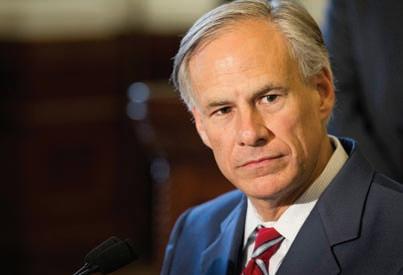
Governor Greg Abbott’s pre-election announcement that he would consider “a very professional entertainment option” signaled that the issue is on the table. Deshotel is retiring, to be replaced by his former chief of staff Christian “Manuel” Hayes. Will the newly elected Rep. Hayes carry on his former boss’ casino efforts and goal of helping disaster-ridden communities?
Speaker Phelan hasn’t made any public comments on the issue of late, but last December issued a statement saying, “These issues are best viewed through the prism of being long-term commitments rather than short-term revenue sources, and (he) believes they warrant a broader discussion on the economic impact that large entertainment investments can have on a community.”
Lieutenant Governor Dan Patrick has a track record of supporting job creation and economic development, and in February 2021 said in an interview on The Chad Hasty Show that “if you want to pitch your casinos or you pitch your sportsbooks, talk about jobs, talk about tourism.” Could we now see passage of casino bills which incorporate pieces of the previous ones? Or something different entirely?
However this turns out in 2023, I believe the legislature will continue to engage stakeholders and do its homework. I’ve spent the last nearly two decades working in the gaming industry and have seen both great successes and myriad mistakes made by well-meaning government entities. Success will be maximized by logical, forward-thinking vision that views resort casinos as major economic engines.
Small thinking and piecemeal legislation will result in undesirable projects with limited economic impacts. A thriving industry which creates good-paying jobs and spinoff benefits in the economy, contributes to communities, and helps the state and localities to meet funding goals is possible, and should be the only acceptable outcome. I am hopeful that this message is being heard in Austin, and that Texas can show the rest of the country how it’s done.
—Suzanne Perilloux Leckert is managing partner with the Convergence Strategy Group (convergencestrat.com) and can be reached at spleckert@ convergencestrat.com.
DECEMBER 2022 www.ggbmagazine.com 23
Will the Lone Star State join the gaming community?
4
Texas Governor Greg Abbott did an about-face before the 2022 midterm elections by saying he would consider legalizing “a very professional entertainment option”
5The Rise of Third-Party Esports Wagering
Nevada and New Jersey are the leaders in developing regulations
Aconstant in the gambling industry is that it is always evolving and seeking new revenue growth streams. One of the newest and groundbreaking opportunities comes in the way of third-party, electronic sports (esports) betting.
Esports is a form of online, skill-based gaming where players compete against each other in tournament-style contests on video games played on traditional gaming consoles or computers. Such skill contests generally avoid gambling prohibitions not through an exemption, but rather because they are not gambling.Skill games are carefully designed to avoid the application of gambling laws by removing the chance element.
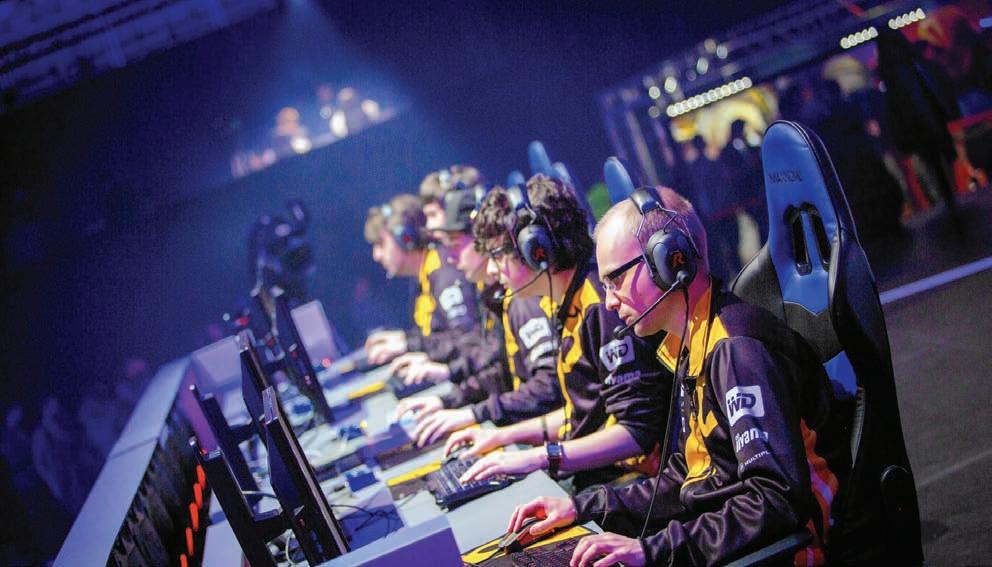
In recent years, the esports industry has exploded. In 2021 alone, the global esports market exceeded $1 billion. By the end of 2022, the market is expected to be close to $1.5 billion, with figures exceeding $5 billion by the end of the decade. The esports market consists of a wide range of revenue streams from sponsorship deals, consumer purchases on video games, in-app spending and merchandise, as well as ticket sales from esports tournaments.
The explosion of esports has had a tremendous impact in the regulated gambling industry as well, evidenced by the passage of gaming laws and regulations concerning esports and imbedding such activity within the parameters of current legalized gambling in prevalent gambling jurisdictions such as Nevada and New Jersey.
For instance, during the midst of the Covid-19 pandemic (when no live sports were being played worldwide), the Nevada legislature created the Esports Technical Advisory Committee, which is charged with providing recommendations to the Nevada Gaming Control Board on what is necessary to safeguard the integrity of third-party wagering on esports in Nevada.
Shortly thereafter, the gaming board approved the placement of thirdparty wagers on esports competitions in Nevada on a per-event basis. Any sportsbooks wanting to offer wagers on esports are required to obtain approval before taking such bets.

In recent weeks, the Advisory Committee voted to move forward with a
draft set of proposed regulations which would amend Gaming Regulation 12, relating to race books and sports pools, to allow the placement of wagers on esports events. Such proposed regulations are to be considered by the Gaming Control Board, and subsequently the Nevada Gaming Commission, by the end of the year.
Under the new regulations, sportsbooks would be permitted to accept wagers without the approval currently required, provided the sportsbook were to follow a series of guidelines, which include obtaining information relating to the video game used for the event, the video game publisher, the event operator used to host the events, technology used to determine the outcome of the event and event rules.
Further, a sportsbook must obtain information demonstrating that the event will be adequately supervised, with effective safeguards in place to protect the integrity of the event and be in compliance with any applicable laws. Of note, the proposed regulations require the sportsbook to notify the Gaming Control Board on a quarterly basis about the operators for events on which they accept wagers.
New Jersey has also amended its sports betting laws to recognize esports tournaments previously approved by the New Jersey Division of Gaming Enforcement (NJDGE) as a “sporting event,” which means that sportsbooks can accept third-party wagers on esports tournaments.
Furthermore, New Jersey is currently considering additional changes to its gambling laws governing esports to bolster the esports betting industry. While no draft regulations have been proposed at the time of this writing, there is a proposed bill that would make the placement of wagers on esports events easier. If enacted, the bill would allow the NJDGE to issue additional internet gaming permits to existing casino licensees for esports.
In sum, the esports industry has the potential to attract a new market of audiences for sportsbook operators. In recent years, esports has evolved from friendly competitions played among friends and collegiate-level competitions to large tournaments with million-dollar prize pools attracting players worldwide. However, with the growing trend comes the potential of increase for misconduct; therefore, to ensure the integrity of esports, there is the expectation that more jurisdictions will follow in the footsteps of Nevada and New Jersey and proceed with regulating the esports market.
— Glenn Light, Karl Rutledge and Salma Granich are attorneys at Lewis Roca.
24 Global Gaming Business DECEMBER 2022

Hold, Spin, Repeat
Of all the modern slot mechanics that exist, hold-and-re-spin is the one that most closely approaches ubiquity
Twenty-six years go, slot-maker IGT started a trend that would lead to one of the most popular—and most copied—slot game mechanics in history. Correct—the bonus wheel.
IGT’s Wheel of Fortune actually was the second game to employ a roulette-style wheel above mechanical spinning reels. A year before that game was released in 1996, Bally had released a game called Wheel of Gold that employed the same style of wheel. It actually had been patented by Anchor Gaming and released by Bally in partnership with Anchor in that game, a slant-top mechanical reel-spinner with a physical bonus wheel.
IGT subsequently bought Anchor Gaming and the patent for the wheel feature. Bally successfully sued to produce its own wheel games, and eventually, the patent was declared invalid, after which a flood of games with wheel bonuses poured forth from all the slot manufacturers.
The wheel has become a mainstay of the slot floor, with scores of manufacturers each producing their own versions of wheels that operate in a manner very similar to that original Bally Wheel of Gold game. It has become a widely accepted element of an array of slot games to this day.
Fast-forward to 2022, and meet the new wheel. It’s called the holdand-re-spin bonus. The idea is that the player is given a certain number of free spins in which to collect icons of some value, the prizes for which accumulate. More often than not, the symbols involved are so-called “cash-onreels” symbols—a symbol that simply displays a credit award.
If the number of free spins is three, every time one of those special symbols appears, it locks in place on that reel spot and the free-spin meter goes back to three. The rest of the reels spin, and every time an additional cash symbol appears, it locks in place for the accumulating award and the spin meter returns to three.
This type of bonus ends when either three spins yield none of the special symbols, or the entire screen is filled with the symbols.
Filling the entire screen with special symbols has become known as a “blackout,” and for many games, it results in the game’s top progressive jackpot.
This type of bonus first appeared on the Aristocrat game franchise Lightning Link, launched in Australia and New Zealand in 2014. It was invented by legendary game designer Scott Olive, who was Aristocrat’s top designer at the time, and who still designs games for the manufacturer from his proprietary Australian game studio, HRG Studios.
Dubbed “Hold & Spin” by Aristocrat, the persistent game mechanic has resurfaced repeatedly from slot-makers across the spectrum. Whether called “Lock & Spin,” “Hold-and-Respin” or any number of other proprietary brands, the basic feature is similar to Lightning Link, Dragon Link and a wealth of other games from Aristocrat.
Slot manufacturers are almost required to offer hold-and-re-spin games in their product libraries these days, for one simple reason: players love it. In fact, players require it.

Olive, who in 2021 was inducted into the EKG Slot Hall of Fame by Eilers & Krejcik Gaming, comments that the simple thrill of the chase is what keeps Hold & Spin popular with players.
“With Hold & Spin, what you see is what you get,” Olive says. “The mechanics make it exciting for players to see what they are chasing in the game. Simplicity is the secret ingredient for the best and most enduring games.”
Like the wheel before it, hold-and-re-spin has likely achieved a permanent spot in the world of slot design. In 2023, we can expect a parade of new games that showcase this simple, ingenious play mechanic.
—Frank Legato
26 Global Gaming Business DECEMBER 2022
6
Aristocrat’s Lightning Link was the first brand to employ the game mechanics with its “Hold & Spin” game technology
Don’t Mess With the Indians
The defeat of the two measures that promoted sports betting in California just emphasized a lesson that has been learned multiple times
On May 12, 2022, while on a panel at the iGaming NEXT conference in New York City, I was asked for my predictions on the two sports betting ballot measures that were to be decided in the November 8 election in California.
I predicted both would fail.
This caused a bit of a stir within the room and was even mentioned during the next panel.
Again, this was in early May.
Later, out in the public areas of the conference, several people came up to me and wanted to challenge me on my prediction. I explained I did not want or wish for these measures to fail—I was merely predicting they would fail. From the response of several people, it seemed I had involved myself in some sacrilegious act.
People wanted to argue with me about offshore betting, lost tax revenues, and unprotected deposits. I again tried to make the point that I was just predicting the measures would fail; I was not turning this whole debate into a morality play.
The following day, I discussed this subject with an individual whose company would materially benefit if the people of California would approve the delivery of sports betting products over the internet. He seemed annoyed at my prediction. He asked why I would say such a thing.
My response was that I had been appointed twice to the state’s Gambling Commission by the governor of California, I had been the consultant to the governor’s office on iGaming matters, and I had served in a like capacity to the two legislative committees that addressed gambling. I also noted I had several quality contacts with the lobbying and legislative assistants of the state. Moreover, I mentioned I had spent over three weeks in October 2021 traveling from one end of the state to the other talking with a great many people in the tribal space, government, industry, and so forth—and based on all of this, I predicted the failure of both measures.

A common notion in poker suggests if you cannot find the fool at the table, it is probably you. Well, to all those folks who sent all of that cash to California for Measure 27, welcome to the table. You have clearly been played, and you have been played hard.
Not only did you get your asses handed to you in this recent election, but you also fouled the nest for the future.
In 1998, some Nevada interests, headed by people such as Steve Wynn and Mike Sloan, took on the tribes over gambling in California. They lost big in challenging Proposition 5. After Proposition 5, they had no idea what hit them. It was obvious to me at the time that their main problems were arrogance and ignorance.
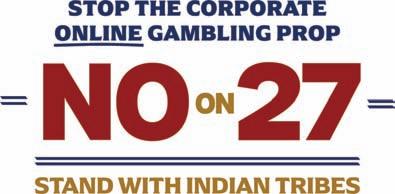
It is for this reason, in an interview in September for the Las Vegas Review-Journal, I suggested that those folks who spent their money believing

that Proposition 27 had a shot needed to “go to a tattoo parlor and have this put on your body someplace: ‘I will never underestimate the tribes in California again. Never.’”
One needs to understand there are about 110 tribal nations in California, and in most instances, they have done an excellent job of integrating with their communities. They are a soft touch for sponsorship dollars and community assistance. They also provide tons of dollars for local remediation programs. Moreover, the vast majority of their employees come from the non-tribal population.
The politicians also like the tribes because the tribes have spent many years cultivating these relationships through discussion and debate—and writing huge checks.
Oh, and that homeless thing. I guess you fell for the old focus group testing play where homelessness tested as a prime mover or some such silliness. Californians were burned by this nonsense with the lottery and education, so that was a weak play. Plus, Californians are not stupid; they knew that was bullshit from the get-go.
It seems some of the people believing the fantasy that was Prop 27 have lived so long within the gaming echo chamber that they have gotten high on their own supply of ego. They have no idea what moves people in California. This is not some gaming conference where everyone is trained to nod their heads on command, and where everyone feels clever and smart.
The strategic plan you all seem to have adopted of throwing cash at things until they go your way may work in some places, but California is the fourth-largest economy in the world. You do not have enough cash to throw. You might want to think about developing an actual viable strategic plan in the future. Just sayin.’
I have no earthly idea who talked these companies into burning such a massive amount of cash on what was a fool’s errand. The leadership of those companies should understand they got terrible advice and paid a very high price for that terrible advice. Moreover, they will not start fresh next time, for they have damaged their credibility and potential future relationships.
As I was scrolling through the Secretary of State’s listing of contributions for Proposition 27 the other evening, I was absolutely amazed at the huge checks that so many of you have sent to California. Hell, you even got Fanatics involved for a ton. My only thought was “what were they thinking?”
Really? What were you thinking?
I think you should all go get that tattoo. —Richard Schuetz is a former casino executive, regulator and educator, expert in all things gaming.
DECEMBER 2022 www.ggbmagazine.com 27
7
Go Green, Go Local
The concept of sustainability is hard to nail down to a single definition, especially within the casino industry. Incorporating eco-friendly construction and design elements admittedly hasn’t always been a top priority among operators—indeed, if you asked all the gaming executives in the industry to give you their definition of sustainability, it would probably involve business models and margins.
However, that tide is beginning to turn, thanks to a shift in consumer expectations as well as operators’ desire to differentiate themselves and provide unique experiences while also forming connections with the land and communities they serve.
Dike Bacon, principal of HBG Design, has seen this transformation gradually unfold over the years. The first thing that has helped the progress of sustainable design, he says, is cost-effectiveness. Sustainability in design has numerous benefits, but if it comes at an extremely high cost, it’s much less likely to be implemented.
“Mechanical systems have gotten so much more efficient and so much better from the standpoint of energy consumption and operation, and they’re cost effective,” Bacon says. “For years, the high-efficiency systems were installed at a substantial premium, in which an owner/operator had to do a math equation to figure out a payback. Now, the design of those systems has become much more efficient and much more cost-effective.
“And so consequently, they get installed. But, at the end of the day for most operators, the bottom line determines everything. Sustainable practices that work financially, they’re pretty well embraced. But if it’s at a substantial premium, it’s a hard argument.”
The beauty of sustainability is that it can manifest itself in many different ways, and sometimes it doesn’t take much planning or investment at all. For example, one of Bacon’s favorite sustainable trends is daylighting, or incorporating natural light into casino floors that are usually dark, gloomy and smoky. Not only do patrons enjoy the brightness and airiness of the design, it’s also cheap and simple, two of the best words in business.
Bacon notes that there has been a “continuously evolving design goal of bringing daylight into the casino environment,” which has “certainly been very successful with Covid.” Sometimes, he says, daylighting isn’t even the result of sustainably focused design; it’s just an attempt to create unique spaces, which in turn results in “a decreased load for lighting.”
He notes that the indoor gardens in the Wynn Las Vegas and Encore Boston Harbor are examples of this, having been created to show off the greenery while also coincidentally cutting back on energy consumption. Even traditional lighting systems have improved with regards to sustainability, thanks primarily to improvements in results—early LED setups “just looked like crap,” Bacon says, which made them undesirable for both patrons and operators.

However, now that there’s been “a concerted effort by the lighting industry to manufacture LED energy-efficient lighting that actually just looks good,” it’s become increasingly popular.
The other big sustainable shift for casinos, according to Bacon, has been the emphasis on locally sourced products and materials. This is also partly due to supply chain hiccups and the Covid pandemic, but nonetheless, it’s been a pleasant change that appears to be gaining momentum. Numerous casino projects in the last two years, both commercial and tribal, have unveiled local collaborations with regards to retail, dining and more.
Now that economic uncertainty appears to be here to stay for the foreseeable future, things like shipping and fuel costs have become considerably more important for operators, and local options represent a more convenient and a more sustainable option.
“Operators have implemented the goal of using more local supplies, more local products—the cost of shipping and certainly that of diesel fuel for what you are trying to ship from, say, China,” Bacon says. “But a result of sourcing products closer to a facility is a lessened demand for energy consumption.
“We are, and have been for quite some time, very acutely focused on specifying healthy materials that are off-gassing. That sort of thing is minimized by healthier carpets and healthier wall coverings and healthier paints, those types of things.”
—Jess Marquez
The Marketing Horizon
Changes in casino marketing are happening quickly and completely, so be ready to respond
The Global Gaming Expo is the can’t-miss event for many operators. For casino marketers, it may appear less critical despite the abundance of information gleaned through the education sessions, on the trade-show floor, or even the numerous opportunities to speak to those who see the horizon and are excited to be reaching for it.
Marketing continues to morph into something that would have been unrecognizable in the past.
The evolving importance of social media was signaled to us as operators first (in the early 2000s) from our guests (even when stalwarts were telling more forward-thinking marketers that social was a fad). Today’s changes are happening so quickly that knowing which trends will help us grow our businesses and which are merely distractions is a challenge. Keeping up can be overwhelming, but third-party marketing reports, podcasts and newsletters can help. However, your best source of trends and indicators will always be observing and asking your guests (and team members, for that matter).
Small-scale testing can help you see the vital trends in your market and whether they are meaningful to your database. These are the trends on the casino marketer’s horizon.
• The “Youngification” of our Core Customer
The wish we had for the millennial customer to visit us has finally come true, but unfortunately, not all of us were prepared. That doesn’t mean we cannot get up to speed quickly. This younger guest has expectations that our core customers never considered quite as critical. This includes a reliable and strong Wi-Fi signal they can access, the ability to still have a great entertainment experience for a slightly smaller budget, and a way to understand and navigate our properties in a way that does not seem like they have traveled back in time.
New member programs should be reexamined for ease and understanding. Welcome offers can no longer wait for the mail to deliver them. Moreover, we cannot wait six months before deploying dueback communications. This new demographic fol-
28 Global Gaming Business DECEMBER 2022
9
8
lows trends, and if you are on the outs, you may just stay there.
Finally, and perhaps, more importantly, our core customers have quickly adopted the habits and desires of their younger counterparts.

• Digital Transformation of Advertising
The Mad Men days when a twist of a phrase could create an entire market are long gone. Quickly following might be traditional advertising channels, as brands move some (and in some cases, all) funds to digital media. As these new communication paths prove their effectiveness, general managers no longer have to wonder if advertising works because they can see the results. In addition to reaching large audiences for a relatively low cost per person or impression, these channels allow marketers to test, iterate and improve quickly. More importantly, they will enable us to meet customers where they are.
• Digital Engagement With our Facilities
This edition of G2E and the conferences that happened since the 2021 gathering all seemed to have two topics in common—sports betting and cashless.
One of the most significant opportunities marketers have before them now is in the palm of almost everyone’s hand: their phones. Though most would consider “cashless” a new frontier, the 20-year-old ticket-in/ticket-out

process could easily have been our first foray into cashless. Cashless, as we have been discussing recently, opens up an entire conversation about how our guests engage with our facilities.
Everi Senior Vice Prsidentof Product Francis Keyser also sees it: “I think cashless has been on the top of everybody’s mind, but that’s only the beginning; it’s only one piece of the pie,” he says. He notes the first thing a customer does when they consider a visit or are curious is to look at your web page. “It’s usually your first touch with them,” he says. He feels operations must have someone who champions the digital experience. Otherwise, we might hold ourselves back from adopting how our customers want to connect with us.
Marketers Must Keep Pivoting
The last few years have accelerated the changes in marketing and how consumers interact with brands. As marketers, we have been pivoting so much that we may form a complete circle soon. Trying new, untested approaches can feel risky, but we must change in response to our market changes and keep up with the trends that further help us understand our guests’ needs and desires.
Julia Carcamo is a casino branding expert and the author of Reel Marketing: The Art of Building a Casino Brand
DECEMBER 2022 www.ggbmagazine.com 29
Tarnished Gems
Japan and Brazil are still waiting for the casino boom

For several years now, either Japan or Brazil or both have made the “10 Trends” feature in GGB magazine. With massive populations and needs for tax revenue, employment and tourism, both countries are “no-brainers” when it comes to the introduction of casinos and/or integrated resorts. But neither country has fully pulled the trigger in such a manner that they’d gain the complete benefits of a land-based gaming industry.
After long and bitter negotiations, with the support of the late prime minister Shinzo Abe—but opposed by a large majority of Japanese citizens—Japan actually legalized casino gaming as part of an integrated resort. But then the opposition kicked in. Because local referendums were necessary to approve integrated resorts in any city, the interest of more than a dozen Japanese cities was whittled down to just two: Nagasaki and Osaka.
Since the first round of IRs in Japan was supposed to be three licenses, it’s not a huge shock to see only two cities as the finalists. But there’s still a long way to go before the doors open on either resort.
In Nagasaki, the IR will be located in the town of Sasebo at the site of the Dutch theme park Huis Ten Bosch. The theme park opened in 1992 and has struggled with attendance its entire existence, actually declaring bankruptcy in 2003. Now, on the eve of the IR approval, it may be sold. Nonetheless, the winning bid came from operator Casinos Austria, which plans a $3.2 billion complex with four hotels, extensive MICE space, and a casino featuring 3,000 slots and at least 400 table games.
In Osaka, MGM Resorts has partnered with the Japanese company Orix for an IR on Yumeshima Island, a man-made structure in the bay. The $13.3 billion project is a mixed-use development, of which part will be the MGM Osaka IR.
Public opposition to the project has been strong, but Osaka officials were forceful in keeping a second plebiscite on the project from happening. But concerns about flooding and infrastructure issues continue to dog the project.
Both Nagasaki and Osaka must receive federal approval to finalize the acceptance of the projects for construction to get under way. It’s still uncertain how that approval process will work and whether opponents will be given a platform to present their cases against the projects. At the very earliest, opening of the IRs is slated for 2029, more than a decade after the idea was first floated.
In Brazil, it’s even more convoluted and tied up in politics.
Earlier this year, the country’s Chamber of Deputies narrowly approved a gaming bill that included multiple casinos in a variety of locations. The measure would also approve various forms of gaming, including a minimum of 43 casinos, 292 jogo do bicho sale points and 6,012 bingo and video-bingo
Earlier this year, Brazil’s Chamber of Deputies narrowly approved a gaming bill that included multiple casinos in a variety of locations. But there was no vote in the Senate because of the presidential election that occurred in October.
The interest of more than a dozen Japanese cities was whittled down to just two: Nagasaki and Osaka. Both must receive federal approval to finalize the acceptance of the projects for construction to get under way.
halls, as well as an unknown number of racetracks and stadiums.
The number of casinos is based on population, whether in a tourist enclave or on a boat. As calculated, São Paulo will be the state that may have the largest number with three, followed by Minas Gerais, Rio de Janeiro, Amazonas and Pará, with two each within tourist areas. Riverboat casino numbers are based on the length of the river, with a maximum of 10. That number could grow because in locations classified as natural or heritage tourist sites, a casino will be allowed regardless of the population density of the state, with a tourist casino no more than 100 kilometers from a casino in a leisure complex.
But there was no vote in the Senate because of the presidential election that occurred in October. President Jair Bolsonaro was defeated, and with him his promise to veto any legislation that legalizes gaming.
The new president, Luiz Inácio Lula da Silva, has promised to let such a bill stand—if passed.
But “Lula” is actually in his third non-consecutive term as president, and his previous administrations have not been friendly to gaming. In 2004 he closed the country’s bingo parlors. He also consolidated lotteries as the federal monopoly Caixa Econômica Federal (CEF). However, last year the Supreme Court ended the monopoly, opening the way for individual states to offer their own products.
Supporters of legalization want to bring it to a vote at the end of the National Congress session and before new House and Senate winners take their seats. Bolsonaro had previously indicated he would, before leaving office, allow the Ministry of Justice to regulate sports betting, which had been under the Ministry of the Economy. This rivalry between the two ministries was seen as a roadblock to regulation this year.
Bolsonaro’s defeat also calls into doubt whether these regulations will be implemented by the deadline. In that event, it would fall to the new administration to implement regulations.
Sports betting, however, had already been legalized in Brazil, and operators are waiting for the regulations to be promulgated.
So like Japan, it’s hurry up and wait in Brazil, as well. —Patrick Roberts

30 Global Gaming Business DECEMBER 2022
10

Everything to Everyone
Chairman Soo
By Roger Gros
It’s the perfect storm of gaming—being able to touch and interact with your customer 24 hours a day, seven days a week—to be able to subtly remind them that you are there whenever they need you. But to do that, you’ve got to be much more than just gaming. You’ve got to be mainstream entertainment.
And above all, you’ve got to be omnichannel. Omnichannel is a misused word in many circumstances, but in this situation, it’s completely accurate and describes being the leading information provider and platform for people who have a propensity to gamble.
It’s a tall order, but if you can even come close to meeting that goal, you’ve captured lightning in a bottle. But that’s the mission of Soo Kim and the company he leads, Bally’s Corporation.

From the Start




It’s a bold goal, especially for a company that started out as a small landbased casino company, Twin River, based in Rhode Island. From that small seed, however, Soo Kim and his team have built a powerful national legacy brand around Bally’s, which, of course, had traction already in the gaming industry. Bally’s started as Bally Manufacturing, a pinball manufacturer in Chicago in the 1930s, and expanded to building slot machines. When gaming was legalized in New Jersey, Bally scored one of the first licenses and opened Bally’s Park Place casino smack in the center of the Boardwalk.
Ensuing years saw the brand change hands many times until it landed with Caesars, which has no interest in expanding it. So when Twin River showed interest in the Atlantic City casino, Caesars sold it for $25 million, and for another $25 million threw in the Bally’s brand. Over the past two years, Bally’s has added almost a dozen casinos to its roster for a total of 16casinos from Rhode Island to Lake Tahoe.

In addition to the name recognition the casinos bring to the brand, Kim signed a deal with Sinclair Broadcasting to brand its series of 21 regional sports networks as Bally Sports. The networks represent 42 professional teams and several major college conferences.
“Bally Sports Network gets billions of impressions a year, and has helped us re-establish our brand,” says Kim.

32 Global Gaming Business DECEMBER 2022
“Sometimes when you are the underdog, the David, you just have to be more intentional about every action that you take.” —Bally’s Chairman Soo Kim
The Bally’s Chicago property has the opportunity to transform the Chicago River
Bally’s
Kim aims for the top, but will technology be his foil?
But maybe the biggest news over the past year has been the awarding of the single Chicago gaming license to Bally’s. Kim says the Chicago property will be a “landmark casino,” and is proud to have bested two impressive rivals, Hard Rock and River City Group, whose owner, billionaire Neil Bluhm, is a native Chicagoan.
“Sometimes when you are the underdog, the David, you just have to be more intentional about every action that you take” he says. “You have to try harder, you have to work harder. I’m an immigrant, I wasn’t born here, and we didn’t come with any advantages. I’ve had to work to carve out a life for myself and my family. In Chicago, we were there to sort of impose our belief system.”
Chicago has always been a highly sought-after destination, with a higher per-capita number of gamblers than perhaps any city outside of Las Vegas—it has long been the largest contributor, outside of California, of visitors to Vegas.
“Chicago is obviously the third-largest metropolis in the country,” says Kim. “But it’s the second-most popular tourist destination in the country, with 55 million tourists a year that visit Chicago. And guess what? They’re all coming to the Miracle Mile, the North Loop, and we are literally steps away.”
Bally’s is currently planning a temporary casino in Chicago in the landmark Medinah Temple building, with a projected opening date of late second quarter 2023. The permanent casino would be located in the River West neighborhood at a location currently occupied by the Tribune building. Opening is expected in 2026.

Bally’s recently closed the deal to purchase the operations of the Tropicana in Las Vegas—gaming REIT GLPI owns the real estate—giving the company a foothold on the Las Vegas Strip. With Caesars rebranding the Bally’s property on Flamingo and the Strip as a Horseshoe, the Trop will eventually join the Bally’s brand. It’s a property in desperate need of a renovation or a complete demolition, but Kim says they’ll take their time before deciding the direction of the property.
While Kim says they haven’t been part of the negotiations thus far, base-
ball’s Oakland A’s are considering relocating to Las Vegas, and have viewed the Tropicana site as ideal for a new state-of-the-art stadium. Reports say it would be a mixed-use development that could include a Bally’s casino.
“We control a very important corner on the Strip,” he says. “And they’re not creating more Strip corners. And it’s for a very modest price, so we can afford to be patient. We’ve built our business by cleaning up other people’s mistakes; we don’t intend to make our own. I believe that there is tremendous potential for a redevelopment at that site, but we want to be cautious and be patient, as the opportunity presents itself.”
As for the A’s stadium deal?
“They just have to feel the love from the community,” he says, “and I think that’s political. We don’t really get involved in that. And so, I hope that this community will figure that out, because I think it would be great.”
A bidding process has begun for another gem for any company’s gaming portfolio, a casino in or near New York City. Kim has a special affection for the area.
“I’m from New York,” he says. “New York is the most important market. It’s untapped. And it deserves to keep its own tax revenues, its own jobs, in the state. I’m a New York City taxpayer; I would like to keep our own taxes. I just think it’s one of those things that’s a matter of basic fairness.”
He admits that the competition will likely be quite formidable.
“I think if people were to make a shortlist, they probably wouldn’t put us on it, and I think that’s great,” he laughs. “Because we are happy to play the role of the underdog.”
Online Ambitions
The brick-and-mortar casinos are just part of the equation for Bally’s. The other side is the sports betting/iGaming end, and for Kim, it’s not happening fast enough. Part of the reason for that sluggishness is Bally’s commitment to owning their technology. That led to the purchase of Bet.Works, an online sports betting platform, and Gamesys, a U.K.-based iGaming company. Incorporating the two has been a journey, according to Kim. Bally Bet is the
DECEMBER 2022 www.ggbmagazine.com 33
The Bally’s Atlantic City property is currently the flagship for the brand’s 16 casinos
regional sports networks have spread the brand across the country
company’s sports betting platform, which is active in only a few states. So the delay is frustrating for Kim.
“We have good technology people; it’s just taking longer,” he says. “I would have hoped that we’d be further along by now. Because North America is so sports-led, if you’re not with sports, you’re not really in the game. But I continue to be very optimistic. I consider that the opportunity set is even more clear than it was before. It’s going to take a little while.”
He says the Gamesys iCasino product, active in New Jersey, is performing well. He says last month the Bally iCasino produced $4 million in revenue in a very competitive market.
“On the iCasino side, there is no one better,” he says. “They have operated in the longest, most-regulated markets, and they’re good. It’s the only platform that works without sports in the U.K. that has substantial market share. I think we have a lot of lessons from our business in Europe and Asia that we can bring to the U.S.
“There’s also an opportunity that when we finally figure out sports in the U.S., we can bring sports out in our existing markets. We still have not introduced a Bally brand internationally, which I think is a really wonderful opportunity, and we absolutely intend to do it. So, there’s still many, many more efficiencies between these two businesses.”
In its most recent quarterly report, however, Lee Fenton, the CEO of Bally’s Interactive, says it’s time to evaluate the tech purchases made by the company over the last two years.
“We are evaluating our money-losing businesses in North America interactive and refocusing efforts where we have faster paths to profitability,” Fenton said during the company’s third-quarter earnings report. “We pulled together a fairly large number of assets in a small space of time; we’ve now had 12 months of looking at that and knitting that picture together. The assets that are not showing us a near-term path to profitability will of course be under the microscope, as they should be.”
He says the company will identify what it will consider a “core asset” and possibly dispose of anything that doesn’t meet that description.
Kim sees online gaming as a very social activity, something that hasn’t revealed itself completely at this time.
“It’s all about entertainment,” he says. “It’s a form of opinionating, actually— a form of interaction. When you put money on something, that’s like saying, ‘Hey, I feel so strongly about this that I’m putting money behind my statement.’ But really, if you think about it, gaming is opinionating, and it should be shared, it should be social, it should be interactive. I
actually think the future of gaming is not sitting in the corner or feeding the machine. I think this future of gaming is as a product and a service to a larger experience that’s interactive, that’s social, that’s casual. A much bigger market.”
Kim believes that content is king in the online space, but that it’s littered with roadblocks and hurdles.
“The current media landscape for content is that it’s all owned by people who are very careful about how they own it,” he explains. “And they all have copyrights, and we’ve got to respect that. Sometimes you have the video rights, but you don’t have the data rights. It’s an almost Byzantine system of the way content producers today monetize their content, whether through a subscription or through advertising. Ultimately what we’re talking about is engagement.”
In the context of the Bally Sports networks, the company has taken a somewhat eclectic path.
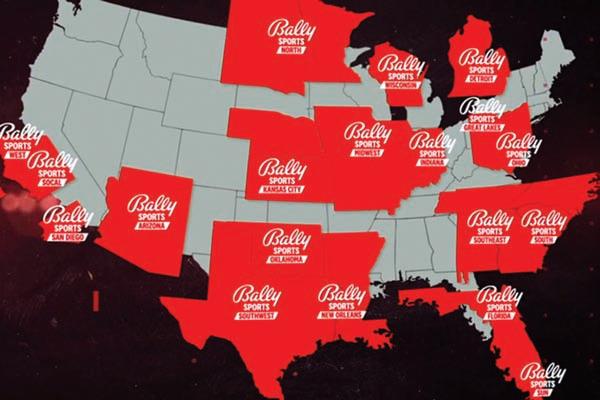
“We’ve been investing in boxing and poker shows and volleyball (Bally’s bought the AVP Beach Volleyball League last year). Soon, you’ll see other sports—we’re in the process of acquiring their rights. We’re not just going to sit on them—it’s not a land grab. We see an interesting set of rights; there’s a lot of them. Let’s collect them, and let’s see what we can do, to make it more fun, more engaging, two-way, interactive, and maybe you’ll put some money on it.”
Kim envisions an entirely different way that viewers will consume sports in the future.
“Look, the user experience for watching games on TV is terrible right now,” he says. “We force people to pay $100 a month, sit alone, in their living rooms, when less than half the Americans have cable. That’s not great. That means the other half literally cannot watch it.
“We don’t want sports to become boxing—pay-per-view, high paywall, no viewership. Sports is built on masses and it’s a shared experience. And we need to bring it back that way. But when the current economics are subscription or advertising, it’s really hard to do. Engagement is the answer. There has to be a third leg to the stool.”
Kim believes that sports betting and online gaming in North America is still in its infancy, and the sky is the limit.
“We’re in the early days, for sure. And we’re going to make mistakes, and it’s going to be a journey,” he says. “But we’re talking about Apple. It’s an idea. It’s an idea for an integrated product, a user experience. If one day somebody says that we are the Apple of gaming, that would be great!”
34 Global Gaming Business DECEMBER 2022
Bally’s
In addition to the name recognition the casinos bring to the brand, Kim signed a deal with Sinclair Broadcasting to brand its series of 21 regional sports networks as Bally Sports. The networks represent 42 professional teams and several major college conferences.
How to Win in 2023: Think Small
How to position your brand for whatever is coming next
By Rich Sullivan
Ah, the end of another year. It’s the perfect time to take stock and reflect on your business—what’s worked, what hasn’t and what’s next. But this isn’t just the end of a regular year for the gaming industry. It feels like we’re on the precipice of a new era, and that the past two and half years were spent furiously priming an enormous pump. Packing gunpowder into a large cannon. Loading the wagon. Pick your something’sbuilding-up metaphor.
As reported by every financial news outlet, this magazine and the American Gaming Association, the casino business has rebounded and roared back from the closures of the 2020 pandemic. As of August, the industry has seen 18 consecutive months of year-over-year commercial gaming growth. The numbers are handily outpacing pre-pandemic figures, so the math isn’t fudged.
This turn of events is simultaneously wonderful and worrisome. No doubt, it’s great news that properties large and small, commercial and tribal, are growing across the United States. It’s great news that sports betting is coming into its own. It’s great news that we’ve seen a shift towards more positive social attitudes regarding the industry and that we’re seeing an influx of a younger demographic.
The follow-on questions, of course, are: How long can this last? Trees don’t grow to the sky, do they? The trend is your friend until the end when it bends, right?
And that’s the worry part of the equation.
This article is not another year-end recap, nor is it a list of advertising trends to watch in 2023. And it’s most definitely not an offering of marketing New Year’s resolutions.
I’d rather present a simple mantra as we all press towards continuing growth, as we should, amid a precariously uncertain macroeconomic backdrop:
Think small.
From our vantage point, just about every operator has ambitious immediate growth plans.
Property expansions, new markets, a pipeline of acquisition targets and other competitive conquests. Decidedly bullish moves across the board, and we share this positive outlook.
Don’t get me wrong. “Think small” is not an expression of trepidation or hesitation. There’s nothing worse than playing scared. This mantra isn’t at all about that.
“Think small” is about positioning your brand to navigate whatever it is that comes next.* It’s about retaining the edge and scrappiness of an upstart. It’s about avoiding the lumbering bureaucracy that emerges as any business grows. It’s about keeping an underdog mentality. It’s about simplicity and clarity of purpose.
(*Hint: no one knows.)
The biggest, strongest brands in the world built their businesses by thinking small. Here are some of their secrets that you can put into practice with your own brand:
Strategy first. Get back to basics here. What are you trying to achieve, and how are you trying to achieve it? What are the core value drivers you need to focus on? As a small operation or startup, these are typically singular and simple. But as you grow, there’s a natural tendency towards complexity and compounding initiatives, stakeholders and interests. The best brands step back and ask themselves, “What’s the one thing we want the world to know about us?” Then they make sure that everything ladders back to that single-minded strategic thought.
Keep plans in perspective. President Eisenhower famously said, “Plans are useless, but planning is indispensable.” The mere act of gathering a team to discuss objectives and key results is often more important than any actual plan itself. I’ll wager that the landscape will continue to shift in ways we cannot imagine—so keep your eyes on the longer term and don’t pledge allegiance to any plan but to continual planning instead. Make sure your marketing team subscribes to the long-term brand strategy but understands that tactics are iterative.
Agility and tactical optimization. Advertis-

ing is an investment, with a return. Nevertheless, in contracting economic cycles, budgets get squeezed. And advertising is always an early sacrifice. The best brands think small by optimizing budgets rather than slashing them. Lean into experimentation, test new things, double down on what’s working and abandon quickly what’s not. When everyone else is slashing, you’ve got to take advantage. Think small and be scrappy about how you compete for share of voice.
Focus on your brand. Casinos are promotional animals, and there’s a reason for that—it works well. But excessive promotion, or getting into a “gasoline war” type competitive promotional trap in your market, can erode profits fast. Strong brands have several competitive advantages, particularly in difficult markets (like the inflationary cycle we’re in now). You’ll have better pricing power, better margins and more loyal players. Think of promotional mix and cadence as a dial that can be adjusted, but your brand messaging needs repeated reinforcement.
Creativity is your secret weapon. Constraint is the mother of creativity, and creativity makes $1 work like $10. Great brands think small by manufacturing constraint. You don’t need a huge media buy to make an impact. Are there newer, cheaper mediums to exploit? What about your player touchpoints? Every small interaction is an opportunity to make an impact. You can be as off-the-wall as you’d like (in most cases, creativity takes some guts); just make sure it’s on strategy.
The next year promises to be full of challenges and opportunities. As the gaming industry prepares to build on record numbers, the casinos that adopt a thinksmall mindsetwill be the ones that continue to adapt and grow. Let’s go to work!
Rich Sullivan is CEO of Good Giant. Formed in 2022 when Nevada-based Foundry and Alabamabased Red Square merged, Good Giant provides comprehensive marketing services with a focus on casino resorts, as well as select brands in CPG, finance and technology.

DECEMBER 2022 www.ggbmagazine.com 35
MARKETING
Just Say Yes
Cait DeBaun Vice President, Strategic Communications & Responsibility, American Gaming Association
You could say Cait DeBaun was thrown in the deep end. Though only three years into her career in gaming, she already has earned a lifetime of experience. Nine months after joining the American Gaming Association (AGA)—on the heels of a recordbreaking year for the industry and in the midst of preparing a campaign for the AGA’s 25th anniversary—casinos across the country were forced to close their doors indefinitely due to the Covid-19 pandemic.
“We had to switch gears overnight to ensure our industry was included in any federal relief like the CARES Act,” says DeBaun. “To rally a coalition of support in Congress, we needed to tell our story and what we mean for communities and the economy.”
She remembers learning of how AGA members were turning their kitchen supplies over to food banks, procuring needed personal protective equipment, or even the little details, like properties that had to go in search of padlocks because they had never physically locked their doors. And telling stories like that is part of what has drawn her to the industry.
“As a communications practitioner, I’ve never been more challenged,” says DeBaun, who began her professional life in agency public relations, where she supported a number of federal public health campaigns like childhood obesity and women’s heart health. Later, she led the U.S. Travel Association’s “Project: Time Off,” which famously advocated for the necessity of vacation time in an effort to grow domestic leisure travel.
“These were rewarding to be a part of,” she says, “but not exactly tough sells.” With gaming, she really has had to navigate headlines and work to sell the inherent benefits of the industry.
At one of her first AGA events, part of its “Get to Know Gaming” effort, DeBaun met a woman who had worked for MGM National Harbor cleaning jobsite trailers during its con-
struction. When the time came to open, they asked if she could do the property cleanup. She’d never done such a thing, but she said yes, succeeded, and now has a company of her own with 30-plus employees. “These are the stories it’s exciting to find and tell because we build careers, businesses and economies,” she says.
Like the woman in her story, DeBaun credits much of her success to simply raising her hand and saying yes, “no matter how big or small the task.” As she explains, offering to make copies might get her into the meeting; taking good notes in the meeting might get her the writing assignment, and so on. “Early in my career, it helped to build rapport with colleagues and demonstrate to leaders I was a team player, curious, and could get things done.”
At the time DeBaun joined AGA, Senior Vice President Casey Clark was working to reframe how the industry thought and communicated about responsibility, and she was enthusiastic about the work. Simultaneously, gaming began to expand rapidly via state-by-state legalization of sports betting, giving the AGA the opportunity to define what responsibility looked like for this segment from the ground up.
“What an opportunity for my interests and background,” she says, which Clark recognized. He has continued to give her the space to grow and lead in this area. “I’ve been fortunate to have managers throughout my career that also became mentors. From my first job at a PR agency to my role today at the AGA, my bosses have invested in me not only for the benefit of the organization but as an individual and professional.”
Looking ahead, DeBaun is enthusiastic about the work AGA is doing on illegal markets. Much like her trial-by-fire work during the pandemic, their reinvigorated efforts in this area require strategic communications and coalition-building, public education and creativity, and will truly reflect what the AGA—and DeBaun—can do for the industry.
Keli Elkins, The Innovation Group
Following Footsteps
Jamie McKelvey Deputy Attorney General, New Jersey Division of Gaming Enforcement
You might say Jamie McKelvey’s entrance into the Atlantic City gaming world was a foregone conclusion. Her mother worked for the Casino Control Commission, when she met her father, a New Jersey State Police officer assigned to the Division of Gaming Enforcement.
Indeed, McKelvey graduated Rutgers Law School in 2013, and in six years ended up as a deputy attorney general with the DGE, where she works in the service industry licensing bureau.
McKelvey grew up in Upper Township, a bedroom community to Atlantic City. Many of her neighbors worked for casinos or for businesses supporting the industry.
“My commitment to public service, instilled in me by my parents, led me to the Attorney General’s Office, and my personal connection to the Atlantic City area eventually brought me ‘home’ to the DGE,” she says.
McKelvey, who earned a bachelor of arts in political science and criminal justice from Rutgers in 2010, served as a county prosecutor for more than two years as her first position after a clerkship. In May 2017 she moved to the Attorney General’s Office, Division of Criminal Justice.
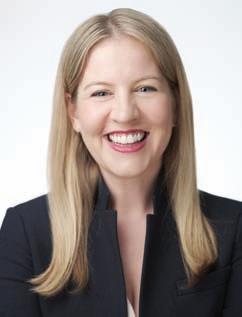

“I had the opportunity to learn about offshore gaming and the social and economic damage it can cause,” she says. “This sparked an interest in me in the regulation of legal gaming and sports wagering and the state’s approach to curtailing illegal gaming.”
With that, McKelvey transferred to the
36 Global Gaming Business DECEMBER 2022
EMERGING LEADERS
DGE, where among other tasks, she investigates and licenses individuals and organizations that do business with Atlantic City casinos, from non-gaming vendors to internet gaming and sports wagering operators.
“I direct investigations, review contracts and related documents, conduct sworn interviews and draft licensing recommendations. Much of my day is spent fielding inquiries from those in the gaming industry who are seeking to do business in New Jersey,” says McKelvey, who finds time to relax with a good book on the beach, a nice bonus of living in the Atlantic City area.
McKelvey cites Judge Patricia M. Wild, J.S.C. (ret.) as a mentor. She shared a similar career path. Wild served as a deputy attorney general in the DGE before working as in-house counsel for many of the Atlantic City casinos.
“Judge Wild has mentored me and provided guidance on being a woman in an industry that is predominantly male, to think critically, and to make decisions based on what is right, even if it is not the popular decision,” she says.
At the DGE, McKelvey has learned much from the guidance of Director David Rebuck, Deputy Director Lou Rogacki, and Deputy Attorneys General Mike Golub and Jen RussoBelles.
One thing seems evident: the gaming industry has a continual need for attorneys to carry out the legal necessities of the industry, especially in an ever-changing gaming world, McKelvey says.
“I recommend that lawyers find an area of gaming they find particularly interesting and learn all they can. When you are passionate about a given topic, you naturally flourish in that area, and with hard work you can become a go-to person on that topic.”
—Bill
Sokolic
Remember Her Name
Agata Maher Director of Marketing Operations, Pechanga Resort Casino
Immediately upon meeting Agata Maher, you are impressed by her confidence and enthusiasm, and it is easy to understand why she was selected as an emerging leader in gaming.
Her career in the industry began 16 years ago at Harrah’s Resort SoCal in the San Diego area as special events coordinator. From there, she moved north to Morongo Casino Resort & Spa in Cabazon to oversee the players club and promotions as the Winners Club manager.
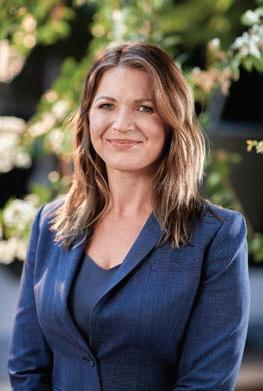
“I have been so fortunate to have worked for and still work with leaders who believe I am the perfect fit for their team,” she says. “They invested in me and today I do the same for others.”
In 2013, she joined Pechanga Resort Casino—the largest resort casino in California—and immediately put her management, planning and training skills to use increasing Pechanga’s club recruitment and enhancing the club experience for members. At the same time, she facilitated leadership courses for Pechanga’s managers that not only established a blueprint for the next generation of Pechanga’s leaders, but a footprint for her fellow leaders at Pechanga and in the gaming industry.
She credits her early career success to the value she placed in herself and her abilities.
“I kept a positive attitude about my work and did my darn best to inspire confidence in others,” she reflects. “That combined with an enormous work ethic set me apart and allowed me to capitalize on many opportunities.”
As the director of marketing operations at Pechanga, Maher oversees departments as disparate as club membership, special events and promotions, as well as entertainment. This means if she isn’t overseeing a giveaway for club members, she’s devising new ways to facilitate better processes to enable guests to enjoy Pechanga’s endless list of entertainment talent.
Tackling problems and difficult situations and turning them into success stories plays into Maher’s strength as someone who finds levels of comfort in areas that many would not. Maher is a change agent who is the connector and lynchpin to the marketing department and other key teams throughout the company.
“A leader’s duty is to care,” she observes. “I care about people and have compassion. I make an effort to know where they see themselves in the future and I keep that in mind when I see opportunities that can help propel them forward.” Through her strong leadership, her team is able to produce creative excellence and deliver on business and financial goals, establishing an environment of continuous capability growth and operations improvement.
Her advice to other young professionals is, first, to stay true to yourself.
“As I look back on my career to date, I am most proud that through all the years, I stayed true to who I was—a Polish immigrant girl who jokes that the best way to remember how to pronounce her name is to say ‘I-GOTTA-REMEMBER-HER-NAME.’”
She also advocates building strong relationships.
“Ensure you have good, trustworthy relationships with your colleagues as well as other external stakeholders,” she advises. “I strongly believe that having great relationships is essential to one’s success and growth within an organization.” —Allison McCoy, The Innovation Group
DECEMBER 2022 www.ggbmagazine.com 37
“I care about people and have compassion. I make an effort to know where they see themselves in the future and I keep that in mind when I see opportunities that can help propel them forward.”
Regulating the Regulators
In the U.S., gaming is now a multi-state, multibillion-dollar national industry. Should its regulators come from outside the industry they oversee?
By Marjorie Preston
Last year, a lawmaker’s wife was quietly appointed to the Pennsylvania Gaming Control Board for a two-year term, at a salary of $145,000 per year.
Frances Regan was installed in a private ceremony, without fanfare, hearings or even a press release. With no prior background in gaming, the wife of Republican state Senator Mike Regan reportedly was an investigator for the federal parole board before teaching “fitness classes to empower women.”
Several months earlier, former Democratic lawmaker Frank Dermody was appointed to the same body, at the same salary, after 30 years in the House. Within three months of losing his political seat, Dermody leapfrogged to the new position, to make about $15,000 more per year than he had earned as a representative.
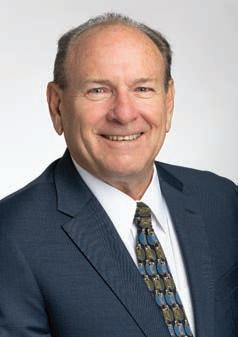
The dual appointments met with skepticism from newspapers like the Pennsylvania Star-Capital, which called the state Gaming Control Board “a patronage dumping ground” for former lawmakers, legislators, and oh yes, their relatives.
The selections “don’t require the state Senate’s approval,” as do others, griped columnist Mark O’Keefe. “There are no clear skills or abilities necessary for membership... It all leads to more significant questions, such as precisely what these board members do to earn such high salaries, and why seven board members are needed.”
If nothing else, such appointments smack of “favoritism to political insiders or special interests,” said Khalif Ali, executive director of Common Cause Pennsylvania, in an interview at the time.
Gaming regulators are charged with watching the store. In Pennsylvania’s case, that store raked in $4.73 billion in revenues in 2021 and could blow past that figure in 2022, especially with the Phillies and Eagles in play. But who is really watching the regulators?
Cleaning Up
When the nation’s first gaming commission was established in Nevada in the late 1950s, lawmakers were acting defensively, to safeguard a money-making business that once had been in the pocket of organized crime.
“They were concerned that the federal government might make gambling illegal,” says Richard Schuetz, a former casino executive who served as a gaming regulator in both California and Bermuda. “The regulatory system was purpose-built to stop the impact of organized crime on the industry, to clean it up and legitimize it.”
At the time, it may have made sense to appoint outsiders, people with no prior link to an insular business tainted by the mob. That thinking still pre-
vailed in the 1970s, when gambling opened up in New Jersey. “They came back with even a stronger regulatory model,” says Schuetz, “and made sure that nobody had ever been involved with the industry.”
But what about now? Gaming has moved beyond brick-and-mortar stores into the hyper-technical realm of mobile and online betting. Should those appointed to oversee it come in as trainees, with no subject-matter expertise?
Gaming attorney Tony Cabot, a founder and past president of the International Masters of Gaming Law and past president of the Nevada Gaming Attorneys Association, says no.
“To populate all these regulatory agencies with people who know nothing about gambling is a really bad idea for a lot of reasons,” says Cabot, who also teaches gaming law at the University of Nevada, Las Vegas. “One of the pillars of regulatory failure is not having sufficient knowledge to regulate the industry—for one thing, the regulated have a huge advantage over you.”
In the case of Pennsylvania, news outlet Spotlight PA charged that, instead of licensing the highest-qualified bidders, state board members “granted licenses based on subjective assertions” by would-be operators, “such as economic impacts and gaming markets.” Clearly, optimistic revenue projections should not be accepted credulously or without thorough vetting.
“Hiring people who don’t know what they’re regulating is a fool’s errand,” Schuetz says. “How would you like it if you were going in for a com-
38 Global Gaming Business DECEMBER 2022
“Hiring people who don’t know what they’re regulating is a fool’s errand.”
—Richard Schuetz, former casino executive and gaming regulator
plicated surgery and they said, you’ll be happy to know the people who oversee these surgeons know nothing about surgery? Or that the bridge you’re driving over was regulated by people who don’t know anything about building bridges?”
As a commissioner in California from 2011 to 2015, Schuetz says, he was the only person with a gaming background, and it was a distinct disadvantage. “We had to stop meetings all the time when they’d use a term like ‘cold deck,’ because no one understood what it was.”
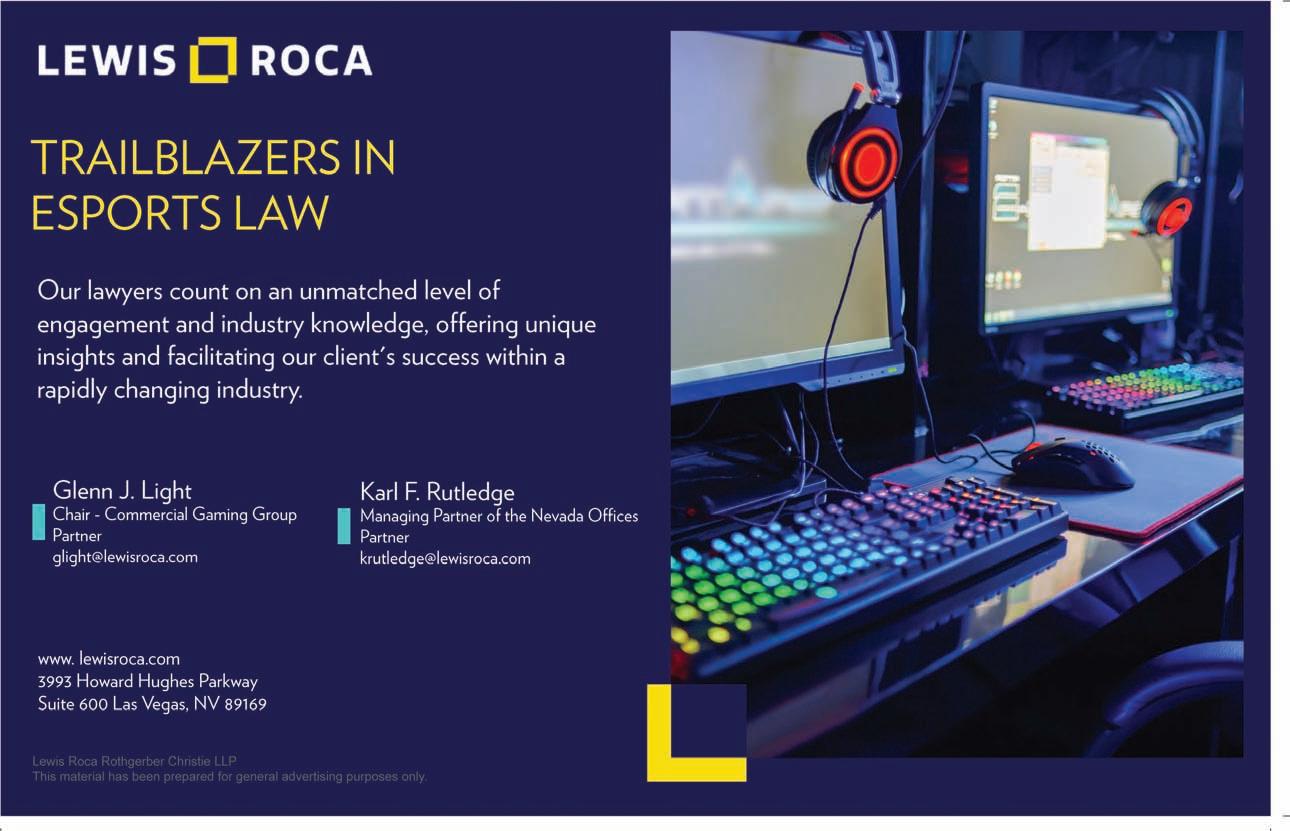
Checks and Balances
It goes without saying that commissioners who serve short terms may not even learn the basics.
“It’s going to take you a year or two just to figure out what you’re doing,” says Tommy Shepherd, gaming attorney and partner at South Carolina-based law firm Jones Walker LLP. “If you have two-year terms and a continuous rotation, you really don’t have a base of knowledge or the experience level to question whether something is the right decision or not.”
In that case, he adds, “You’re going to have to take the recommendations of staff.”
Which may not be a bad thing altogether. Mississippi’s three gaming commissioners—including a lawyer, a banker, and the owner of a group of convenience stores—don’t pull down six-figure salaries, but get a $40 per diem 12 times a year, for an annual total of $480.
“So to expect them to be extremely knowledgeable about the industry
from the start is not realistic,” says Shepherd. “But it can work if they’re honest, above-board people who take the time to learn, meet with members of the industry and get educated on the issues, and are backed up by a very professional, deep staff.
“While they’re the ultimate decision-makers, there is typically a staff that works at it day to day and makes the recommendations; in that case, I’m less troubled by commissioners or board members being unfamiliar with gaming,” says Shepherd. “But it has its merits and demerits to get information funneled only through staff. That’s not healthy either.”
A simple solution in such cases: talk to more seasoned regulators from other states, hire professional consultants, or both.
“At G2E, I tried to make sure that regulators from some of the newest jurisdictions, the ones whose staff members may not have a lot of gaming experience, were introduced to regulators with more gaming experience,” says Shepherd. “‘Hey, do you know the folks from Mississippi? Do you know the folks from Louisiana? Do you know the folks from Virginia? Do you know the folks from Tennessee? You all need to talk.’
“If you have that face-to-face introduction, it’s much easier to pick up the phone and say, ‘Hey, we’ve got this issue pending that we’ve never faced. How would you guys look at this?’”
Cabot agrees that seasoned staffers may bring “a ton of institutional knowledge” to advise new appointees and get them past the learning curve, “as long as all parties are willing to share their knowledge, experience and expertise.” In that scenario, a non-gaming professional with expertise in related
matters can even be beneficial, “almost like bringing in an outside member of a board of directors who’s good at auditing or finance.”
“The worst circumstance,” he says, is when a person takes the job for the prestige, the pay, to bump up a government pension, or to do the bidding of higher-ups.
“Sometimes they go into that position viewing how they act within the construct of the political atmosphere in which they’re appointed,” says Cabot, “making decisions based on friendship or politics. There have to be checks and balances.”
Technical Difficulties
The work is more challenging in the digital-first era. Mobile sports betting and online betting are intricate technologies that can’t be grasped quickly. But in states that need money, there can be a race to get the cash cow market-ready.
“They legalize sports betting, then some politician says, ‘We’re going to be open by New Year’s, or football season, or the Super Bowl, or March Madness,’” says Schuetz. “What they should say is, ‘We’ll open when the regulatory agency’s ready.’” To do otherwise can “damage the industry and detract from its ability to be sustainable.”
In August, Massachusetts Governor Charlie Baker signed a bill to legalize sports betting. Since then, gaming commissioners have debated issues of licensing, consumer protections, advertising rules, responsible gaming programs and the like, as well as launch dates. Commission spokesman Tom Mills told news station WBUR that the team needs to formalize “over 200 regulations.”
Fans are pushing for a speedy launch, and lawmakers certainly want to start reaping the estimated $60 million in projected annual revenues that could come from the bets. Commissioners Brad Hill and Jordan Maynard want to go live by Super Bowl LIV in February. But Commissioner Nakisha Skinner has questioned what she called an “aggressive” push to open.
“If this compressed timeline makes sense and it’s responsible, I’m all for it,” Skinner said. “I just need to understand the rationale for why there’s this compressed timeline being advanced, as opposed to a reasonable timeline by which the team can get this done.”
In response, Boston sportscaster Mike Mutnansky tweeted, “The people don’t seem excited about a timeline that might not allow for legal sports betting in Massachusetts in time for the Super Bowl.” To which a follower replied, “Complete group of bozos running this state.”
Interestingly, a voice of reason came from sports fan Liam Arnason, a student at the University of Massachusetts, who told Springfield news station WWLP, “I think it is faster than I expected... I think it’s cool, but at the same time, it has to be standardized.”
Getting It Right
Shepherd callsVirginia a great example of a relatively new jurisdiction that’s done it the right way.
“They got the expertise they needed when they realized they didn’t have it in-house.” Among the recruits: Gina Smith, former Maryland Lottery and Gaming Control Agency (MLGCA) executive, who was tapped to serve as the Virginia Lottery’s new deputy director for gaming compliance, and Bob Fontaine, former principal counsel for the MLGCA, as deputy general counsel
for casino gaming and sports betting regulations.
Those appointments, among several others, “gave them a tremendous leg up on not only regulating the industry the right way, but doing the investigations the right way, bringing mobile sports wagering up very quickly and getting the revenue stream going for the state,” says Shepherd.
Similarly, in Florida, a new gaming commission was created in May 2021 after lawmakers passed a new compact with the Seminole Tribe. At the body’s first formal meeting, Louis Trombetta, director of the Division of Pari-mutuel Wagering at the Department of Business and Professional Regulation, beat out two other finalists to be named executive director.

Commenting on the appointment, Commission Chairwoman Julie Brown said, “Having gaming experience is helpful,” as is “having legal experience, knowing that rulemaking is going to be a critical component of this commission.”
Along with minimum standards (at least) for commissioners, Shepherd says there should be “some sort of consistency of regulation from jurisdiction to jurisdiction.
“It doesn’t mean they have to be identical, but if an issue is multi-state in nature, let’s say for mobile sports wagering, you don’t want one jurisdiction to jump out in front and fine someone a gazillion dollars, because that makes other regulators feel like they have to do the same thing.
“There should be some consistency in reaction to incidents—‘Have we fixed the problem? Will it happen again?’—versus a knee-jerk reaction to really punish these people.”
Until such time, in some cases gaming commission appointments may continue to be perks for the privileged or golden parachutes for termed-out government workers. Cabot says the perception that gaming insiders may be biased is no longer legitimate. “Today, with the industry as big as it is, there’s really quite a large talent pool, big enough to find the best qualified regulators.” It should be no problem for states to identify, evaluate and sanction regulators who can fulfill their duties with expertise and integrity.
Or as Schuetz wrote in a January 2021 column for this publication, those making the appointments should “work to secure talent who actually can understand the complexity of the industry.
“Too many jobs, tax dollars and economic activity are involved to make this a dimension of the political nonsense that plagues so much of our country. Moreover, expecting lay people to understand the complexity of the modern gaming industry is a stretch goal that has a small likelihood of success.”
40 Global Gaming Business DECEMBER 2022
“It can work if they’re honest, above-board people who take the time to learn, meet with members of the industry and get educated on the issues.”
—Tommy Shepherd, gaming law attorney and partner, Jones Walker LLP
For more than 30 years, Casino Player Publishing has thrived as publishers of America’s most popular gaming lifestyle magazines—Casino Player and Strictly Slots. Over the decades, millions of gamblers have enjoyed and benefited from the expert tips and gaming strategies, as well as the insider information not found anywhere else. Whether they are improving their video poker skills, searching for the latest slot to hit the floor, learning to navigate through a sportsbook or checking out the most luxurious new gaming resorts to open, CPP delivers the information, in a highly enjoyable format, directly to their door. Connect with thousands of gaming enthusiasts with Casino Player and Strictly Slots and discover how your marketing dollars will work for you.












New apps, new e-newsletters and new marketing opportunities
All over America, players are escaping to the best casino resorts in the comfort of their own homes!
Loosest Slots Certification Program • “Best Of” Campaigns • Product Reviews • Property Spotlights Digital platforms including e-newsletters, web and mobile delivered to highly targeted demographics FINDING A LUCKY MACHINE ■ MASTERING BLACKJACK BASIC STRATEGY
for Gaming’s Elite THE BEST Casinos Hotels Rooms Suites Comps Promotions Service • Slots • Video Poker • Table Games • Players Clubs • Dealers Sportsbooks Spas Golf Courses Casino Where You Feel Luckiest Casino Resort to Vacation At & Much, Much More! BEST OF GAMING 2021 StrictlySlots StrictlySlots PLUS GOING FOR THE BIG PAYDAY BACK-TO-BACK JACKPOT TALES n NEW CARDS, NEW REWARDS ▼ Holding the low-card kicker in Double Double Bonus Poker New York casinos, historical horse-racing games, Jade Wins Deluxe, Golden Wins Deluxe deliver classic gameplay evolved; exciting new games offer rewarding dual-wheel bonuses in theater-like experience SLOT PLAY SNIPPETS More info: info@casinocenter.com • 800-229-8516 • www.casinocenter.com Your Partner With The Gaming Consumer
CasinoPlayer Casino
Paying It Forward
Payment technology has successfully met the challenges of today’s gaming industry
Here’s the sector that literally pays.
Perhaps nowhere has the gaming industry met customer demand better than in payment options. Innovation spans several realms over the years—from payment access to funding methods, from mobile to wallets—all timely unveiled to match escalating customer demand.
Enhancements tied to payment options include marketing, player retention and recruitment areas. The newest upgrade is a responsible-gaming niche hailed by players, operators and gaming regulators. Players can put money back in their wallets as easily as they withdrew it, avoiding the temptation that comes with excess cash in one’s pocket. Responsible-gaming innovation matches the casino philosophy of not wanting players to gamble away their last dollar.
This is a good time to be in the payment sector. It’s a star performer in the gaming industry.
The Payments Potpourri
The drive for convenience and speed in payments remains prominent, according to Victor Newsom, senior vice president of product management, payment solutions for Everi Holdings.

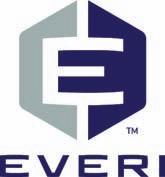
“A buzzword that you’ll probably hear more and more in our sector is ‘embedded finance’—it’s already big in the fintech space,” Newsom says. “Along with what we deliver with banking as a service, the next evolution is trying to make payments as transparent as possible. ‘Embedding’ them in the customer journeys is going to be an ongoing focus. It’s more about choice and omnichannel access, because otherwise it’s not transparent.”
Newsom says the company has been successful giving customers a choice of channels and instruments. That includes multiple self-service kiosks, cage, tables, slots, mobile, retail, and web channels with cards, check, Apple Pay, PayPal, PayNearMe, RTP, crypto and more.
“We’re giving consumers an option of when and how they want to access it,” he says. “In our sector, we’re seeing a healthy economy. So, it’s even more critical for us to be able to provide our services in a way that is value-added, both for the casino operators and for the patrons.
“We had record quarters, as heard on our earnings calls, and I would like to suggest that some of that is because of how we’ve come to the market.”
Newsom says cash remains king, and that Everi is able to provide more access points than its competitors.
He also touts the company’s continued success with QuikTicket as the best performing product in the space. It is cashless and doesn’t require an account to sign up. Players are able to get a TITO ticket with a point-of-sale (POS) debit transaction on a self-service device. Patrons don’t have to wait in line at the cage as they would with a debit card cash advance.
It allows operators to bring in new patrons who never tried this type of transaction, according to Newsom. This is part of a regular PIN debit purchasing-type transaction flow.

Part of why it’s successful is that it’s available to anyone who is doing a card-based transaction, and that purchase goes through as a gaming credit purchase, Newsom indicates. That convenience gained more focus during Covid, with customers worried about handling cash at ATMs.
“Debit transactions overall have been trending positively anyway,” he says, “but with QuikTicket we see a natural attraction, without marketing incentives. We’ve seen over 30 percent on average of debit volume will move to this product, operators will see a lift in new net users, and people who find this convenient will use it more and spend more.
“We’re very pleased with it. It fits in with the cashless narrative, but it doesn’t require a mobile account or wallet to use.”
Newsom promotes a significant product enhancement that makes it even more valuable. “Visa has allowed us to take that same anonymous QuikTicket purchase with their debit card and do it in reverse,” he says. “We were the first and only current land-based, card-present, non-account-based choice for this because we were uniquely positioned to deploy the controls that card schemes require to be in place behind the scenes.
“So when patrons cash in a TITO ticket, they have a choice of sending it back to their bank using the same debit card they purchased the ticket with, and they can do so without having to sign up for any account.”
Newsom believes that patrons may consider an amount like $1,000 going back to their bank instantly, in real time, more attractive than putting that cash in their pocket.

From a responsible gaming aspect, the ability to send money back to one’s account instantly is ideal. One innovation leads to another.
“In addition to QuikTicket introducing a full cashless, account-less, in person, self-service life cycle, one can ‘prime the pump’ for the bigger digital transformation that we see emerging in the industry,” he says.
“That lends itself into the company’s CashClub Wallet product well, as far as being able to do many of those same things, and it lends itself into other use cases across the family of cash flow products, whether they’re at the
42 Global Gaming Business DECEMBER 2022
cage or at the gaming table.”
CashClub Wallet technology acts as a digital fabric across all the infrastructure that land-based casino operators have invested in and integrated into all aspects of operations, compliance, loyalty training, and internal controls, he asserts. It also plays a role in helping operators retain longtime customers.
Newsom indicates that Everi does not label any particular product as one geared at retaining customers. Rather, each is a spoke in a great big wheel.
“One of the things that we look at is helping our operators choose,” he says. “We don’t tell them how to run their business or drive their business model. We help the operators choose what aspects of the customer experience that they prefer—based on the realities of what they’ve invested in internally already, and that has a wide array of configurations.”
Newsom cites an example that some operators have chosen not to charge a consumer a fee to load in the digital channel, but still charge that fee at the cage. They may also have Everi provide an app or a specific retail POS system.
Regarding the next wave of innovation, Newsom says Everi has taken its time going into the online space, but it has the infrastructure in place to make “brick-to-click” a “wow factor” for 2023.
“Everi also recently announced the acquisition of Veneutize, which is in line with our long-term strategy of moving beyond the gaming floor and even beyond the casino walls into venues outside the resort,” Newsom says. “So, we’re not just focused on doing ‘on-us’ transactions inside the casino, but we’re also offering full, retail-enabled loyalty via mobile technologies, and then bridging the gap so our customers can now have a truly integrated digital strategy.”
VIP Preferred Adds New Elements

Christopher Justice, president of Global Payments, sees the industry tightroping between the pandemic aftermath and a looming economic pullback.
“The payments industry is going through incredible change right now,” he says. “While the pandemic itself has somewhat abated and its grip on society has slackened, its effect on the payments industry continues to shape how people pay for things on a daily basis. The convenience that was made necessary by the pandemic, i.e., cashless and contactless payments, is now here to stay.
“Now, of course, our economy is headed into a downturn,” he adds. “Retailers of all kinds are looking for ways to save on operating costs, including in their payments systems. Payments technology providers will likely pivot to solutions that help save money and give operators their money as quickly as possible.”

Within this environment, Justice indicates that Global Payments’ standard e-check network, VIP Preferred, continues to thrive. It enables casino patrons to seamlessly connect their checking accounts to more than 400 inperson and online casinos. VIP Preferred delivers a payments experience of unmatched convenience and ease, he asserts.


And it has been upgraded.
“We have enabled VIP Preferred users to use digital banking credentials to sign up for VIP Preferred online,” he indicates. “This new feature is designed to make it easier for new
users to create their account.
“VIP Preferred also enables all Global Payments’ other solutions. VIP Mobility, the industry’s first mobile solution enabling true cashless gaming, utilizes the VIP Preferred e-check network to provide quick and easy payments. VIP Preferred also powers Global Payments’ comprehensive self-service solution, VIP Financial Center, which allows patrons to access the services they need without waiting in line at the cage.”
Global Payments also uses digitally nurturing programs like the Partner Assist Program and the Member Rewards Center to encourage current users to continue using VIP Preferred.
As his company integrates with a changing marketplace, Justice believes the sports-betting realm will remain robust.
“While the American economy is slowing down, the growth of iGaming and online sports betting shows no signs of stopping,” he asserts. “Both online and in-person gaming institutions will likely invest heavily in sports betting and in technology to improve sports betting.
“The payments industry more broadly will also evolve over the coming year. Retailers of all stripes are implementing cashless payment systems, be they online or contactless payments. However, while restaurants and grocery stores have integrated these solutions rather successfully, the question remains how gaming institutions will use them.”
Upgrading to Top Product
Craig Libson, CEO of Flexia Payments LLC, promotes his company’s innovation connected with its Flexia Cashless solution.



The product already eliminates many of the current pain points of cashless while maximizing its flexibility and efficiency across the casino resort— from enrollment, compliance, and onboarding across multiple systems to funding, loyalty, data, and marketing.
Now it takes another step up.
“We launched our new InstaPlay module first and foremost to empower seamless, real-time customer onboarding to the Flexia Cashless solution and the casino management and loyalty systems,” he says. “A scan of a program-specific QR Code initiates a simple registration process, complete with KYC/fraud checks, enabling instant enrollment and the issuance of the multi-account Flexia Card, which can be either a physical plastic card issued at the casino or digital only appearing in the player’s app.”
Libson considers the magic of InstaPlay its ability to facilitate the variety of customer relationship scenarios—from existing loyalty members with personal data on file to brand new customers, with no previous information on file—and Flexia’s ability to tailor the InstaPlay process to leverage existing data or customer touchpoints the casino may already have to further streamline the process.
“It’s no secret that some prior cashless solutions which were rushed to market have soured the taste of the gaming community to cashless due to the inefficiencies and awkwardness of the onboarding processes,” he indicates. “When casino operators experience the speed and fluidity of our InstaPlay, there’s almost a sense of amazement in how easily and intuitively we can onboard customers.”
Regarding the art of incentivizing or retaining customers, Libson says the company’s approach to cashless has been its technical and strategic integration with casino loyalty programs and the solution’s powerful marketing tools and data sharing.
“We’ve developed new ways for the operator to drive additional customer engagement, from casino-branded card graphics and linking the Mastercard account spend for players to earn casino loyalty points, to providing flexible tools for targeted in-app promotional messages and sharing the data about where their customers are spending money outside of the casino with the operator,” he says.
The FUZION Infusion

JCM Global continues to thrive with its patented FUZION system. The company considers it a breakthrough gateway for developers of all types to integrate their digital wallet technologies onto gaming floors, giving casino players additional transaction options.
FUZION is built with an encrypted data superhighway so slot machines equipped with it can securely accept digital wallet payments. Plus, it is a highly advanced and flexible technology that makes the path to cashless easier, regardless of the casino management system. Additionally, it enables both NFC and Bluetooth transactions at the EGM.
JCM’s Mobile I/O technology offers operators two options to enable cashless transactions at the EGM: BLE Mobile I/O, an internal module that plugs into the USB port of JCM’s Peripheral Network Adapter (PNA) unit inside the EGM; or NFC Mobile I/O, an external module that mounts to the EGM.
Once connected, mobile applications developed to interface with Mobile I/O allow players to use their mobile device to securely identify their EGM location, conduct transactions, receive and act on marketing and promotions, verify their wagering ID, and more.
“This is an exciting time for payment options because operators and their players have more choices than ever,” says Dave Kubajak, senior vice president of sales, marketing and operations for JCM.
“JCM has been leading the way for cashless payments with our FUZION system. With it, suppliers can integrate mobile wallets, and operators can choose whether those connections happen using near-field communication (NFC) or Bluetooth.”
JCM introduced FUZION a few years ago, offering a wealth of capabilities that include cashless payments. One of FUZION’s benefits is that it is system-agnostic, Kubajak says.
“Any casino with any system can use it, and no casino system upgrades are required,” he indicates. “Any supplier can integrate their mobile wallet technology through secure APIs, whether they use NFC or Bluetooth.
“Of course, paying with cash or using paper tickets remain attractive options for operators and players. There have never been more ways for guests to play, and that makes us look forward to the future.”
The viewpoints of these companies, combined with their product rollout, indicate good news for consumers and operators. Patrons can be both enticed to gamble and given the mechanism to play responsibly.
44 Global Gaming Business DECEMBER 2022
More
a
or resource guide, Tribal Government Gaming features editorial coverage of cutting-edge issues such as tribal sovereignty, Indian gaming regulation, economic diversification, nationbuilding, compacts and more.
Tribal Government Gaming reaches key decisionmakers in the Indian gaming and traditional casino industries, including operators, regulators, manufacturers and vendors.
Tribal Government Gaming is a highly visible publication with a circulation of 20,000, including bonus distribution at NIGA in March 2023, OIGA in August 2023, G2E in October 2023 and other appropriate trade shows and conferences.
As an annual publication, Tribal Government Gaming will offer a one-year shelf life providing increased frequency and recall for advertisers. Sponsorship opportunities are available for increased marketing awareness.

AN ANNUAL INDUSTRY REPORT Don’t miss your opportunity to reach tribal gaming executives from all corners of the industry!
than just
directory
Ad Space Deadline: FEBRUARY 22, 2023 I Publication Date: MARCH 1, 2023 For more information on advertising, please contact Terri Brady, Director of Sales & Marketing phone: 702-248-1565 x227 I email: Tbrady@ggbmagazine.com PUBLICATION A GGBMagazine is proud to announce the 2023 edition of TRIBAL GOVERNMENT GAMING:An Annual Industry Report, the most comprehensive publication available covering all Class II & Class III tribal gaming operations.
by Frank Legato
Jackpot GO! Gaming Arts
This game is part of the new “GO!” series on Gaming Arts’ VertX Grand large-format cabinet. (The other inaugural game in the series is Tic-Tac-GO!) It features a unique game mechanic that leads to one of three progressives.
Manufacturer: Gaming Arts
Platform: VertX Grand Format: Five-reel, 243-ways-to-win video slot Max Bet: 50, 250, 500, 750
Denomination: .01 through 50.00 (playerselectable)
Top Award: Progressive; resets at $5,000 Hit Frequency: Approximately 40% Theoretical Hold: 4%-15%
The base game is a five-reel, 243-ways-to-win video slot. Above the reels are three progressive meters, each with a number or numbers assigned to it. The game features a player-selectable denomination, and the levels of the progressives change according to the denomination selected. The maximum jackpots reset at $50, $200 and $5,000.
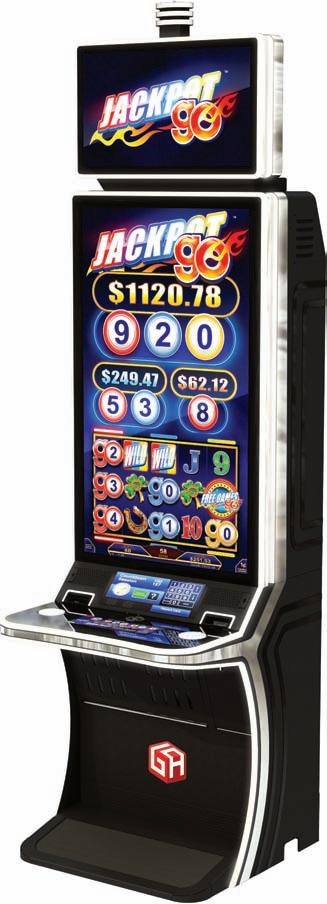
At the start of play, the player touches the jackpot meters to select his or her “lucky numbers.” The “Yellow” jackpot displays a single number; the “Blue/Yellow” jackpot displays two numbers, and the “Red/Blue/Yellow” jackpot displays three numbers. The player can select different numbers for each jackpot, or can select duplicate numbers. Alternatively, there is an “easy pick” feature that selects the numbers for the player.
During game play, progressives can be won if the “GO!” symbols match the player’s selected numbers. A yellow “GO!” on the fifth reel displaying the player’s number returns the bottom jackpot; a blue “GO! and a yellow “GO!” on reels 3 and 5, the middle jackpot; and red, blue and yellow “GO!” symbols matching the player’s
Rock Paper Scissors Aruze Gaming

This latest game in Aruze’s Activ-Play series replicates the age-old children’s game Rock Paper Scissors. On the large-format Muso Curve 55 cabinet are buttons to wager Rock, Paper or Scissors. At the center of the screen is an LED representation of a hand that ends up with one of the three gestures of the classic kid’s game—a fist for Rock, an open hand for Paper, or a two-finger sign (like a V for victory) for scissors.
The game carries a $1 denomination, with a maximum bet of $500.
Just like in the kid’s game, Paper covers Rock, Scissors cut Paper, and Rock smashes Scissors. The game progresses through rapid wagers and outcomes. When the player wins, a prize wheel at the center of the 55inch screen spins to a credit award or one of two
lucky numbers on the first, third and fifth reels return the top prize. There also is a free-spin feature. Bonus symbols on the first third and fifth reels award 12 free spins, during which the jackpot feature remains active with the player’s selected numbers.
The jackpot frequency is very high—according to the manufacturer, the jackpot feature occurs once every 52 plays.
progressive jackpots, the Ruby resetting at $250 or the Diamond resetting at $5,000. If the player picks the same outcome as the computer, it is a tie, and the game repeats for free.
There are five levels to the prize wheel, the range of credit prizes rising with each level. Each time the outcome is a tie, the prize wheel level rises by one for the following game, until reaching level 5. Top credit prizes range from $50 at wheel level 1 to $150 at level 5.
46
NEW GAME REVIEW Global Gaming Business DECEMBER 2022
Manufacturer:
Platform: Muso
Format: Video
game Max Bet: 500 Denomination:
Top Award: Progressive;
reset Hit Frequency: 33.3% Theoretical Hold:
Aruze Gaming
Curve 55
picking
1.00
$5,000
3.62%-11.62%



Strength in Numbers Member companies from 22 countries Nearly $21 billion in direct revenue • 61,700 employees 13 publicly traded companies • ONE POWERFUL VOICE Daron Dorsey, Executive Director +1 702 277 3641 • Daron.Dorsey@AGEM.org Tracy Cohen, Director of Europe +44 (0) 7970 833 543 • Tracy.Cohen@AGEM.org Connie Jones, Director of Responsible Gaming +1 702 528 4374 • Connie.Jones@AGEM.org AGEM.org Address worldwide industry expansion, regulatory and legislative issues • Discounts on major trade show booth space Promote responsible gaming initiatives • Updates from influential global industry leaders Advertising discounts in leading industry publications • Educational partnerships benefiting students and members Visibility in AGEM’s print advertisements • Exposure for publicly traded companies in the monthly AGEM Index Join AGEM today and work together with the world’s leading gaming suppliers. ©2022 Association of Gaming Equipment Manufacturers (AGEM). Membership list current as of November 2022. Design & photo-illustration by Jeff Farrell.com • AGEM and charter ESP member since 2007.
Scarab Ultra
Scarab Ultra is the latest iteration of Scarab, one of IGT’s most successful titles on dual-screen cabinets. It delivers everything players expect from the original game with an all-new jackpot playoff with a guaranteed jackpot win.
The base game is a five-reel, 75-line video slot. Housed on the state-of-the-art CrystalCurve Ultra cabinet, Scarab Ultra features a new animated Golden Scarab symbol that initiates multiple golden frames during play. In the base game, players have 10 games to land a Scarab symbol on the reels. When the Scarab symbol is landed, it turns the position into a golden spot.
After the 10th wagered game, each collected golden spot turns into a wild for the “Wild Stays Charges Then Pays” feature that can lead to huge wins.
After three or more pyramid symbols land, the free game selection screen is activated and offers three player-selectable options for the opportunity to play for more spins or more wild positions.
Finally, when three or more golden coin symbols land, the jackpot playoff is triggered, and players can win one of five different progressive jackpots. Scarab Ultra is an 80-credit cost-to-cover game.
Treasure Spirits Ainsworth Game Technology
This new game series featured on Ainsworth’s A-STAR Curve cabinet (it also is available on the A640) includes a strong primarygame feature along with a unique hold-and-spin event.
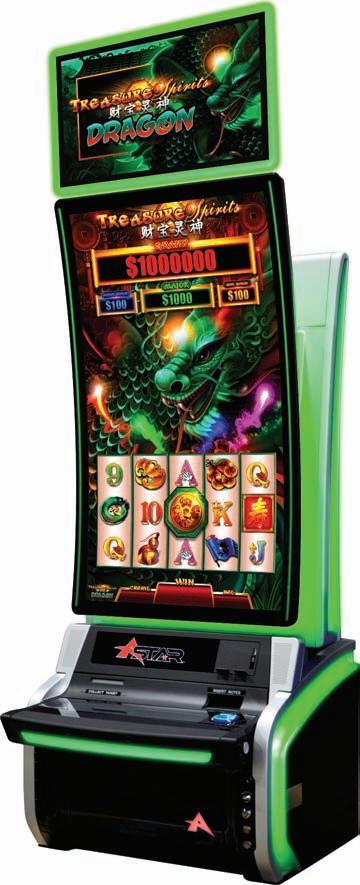
The base games are Treasure Spirits Dragon and Treasure Spirits Phoenix. Each is a five-reel, 243-ways-to-win video slot, with a four-level jackpot. The bottom two jackpots are fixed prizes, beginning with a $10 “Mini” an a $50 “Minor” at the penny denomination. Those lower jackpot levels increase as the player wagers more—the games feature player-selectable denominations of .01, .02, .05 and .10. At the top denomination, the Mini and Minor return $100 and $500, respectively.
The top jackpots are progressives (linked or stand-alone), resetting at $1,000 (Major), and the Grand, resetting at $10,000 or, at the .10 denomination, $100,000.
Randomly during the primary game, an “Instant Win” feature will occur when a pot of gold fills up the fifth reel with a box on the first reel displaying a credit award, the Mini or the Minor. The level of the Instant Win can be as much as 200 times the total bet.
Yin-yang symbols on the first, third and fifth reels trigger six free games, with retriggers. The free games include a 2X wild symbol.
Gold bonus symbols on the first, third and fifth reels trigger Ainsworth’s unique “Hold ‘n Stack” feature, a hold-and-spin event with a twist. The gold bonus symbols lock in place for five free spins. When other bonus symbols land, they stay in place. Instead of the typical return to the original freespin count, extra-spin symbols award one, two or three extra spins.
Manufacturer: Ainsworth Game Technology
Platform: A-STAR Curve, A640 Format: Five-reel, 243-ways-towin video slot
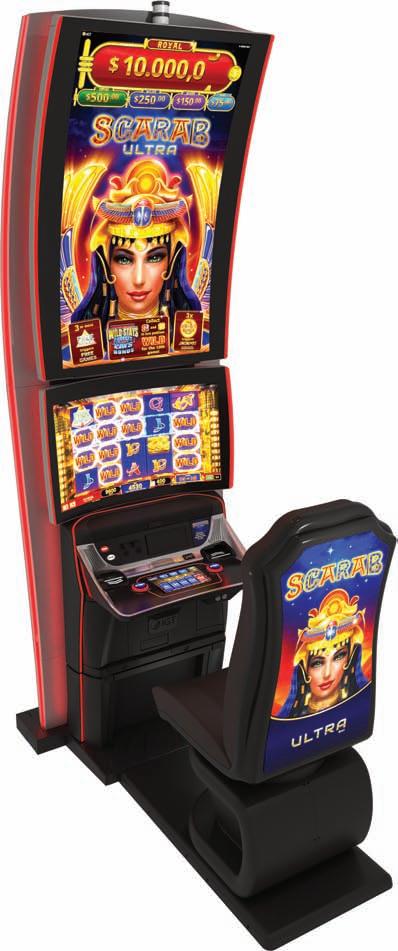
Max Bet: 450, 900
Denomination: .01, .02, .05, .10 (player-selectable)
Top Award: Progressive; resets at $10,000, $100,000
Hit Frequency: 32.31%
Theoretical Hold: 6%-9%
Above each reel is a bonus amount. Those amounts rise with each free spin. Randomly, one of the top two progressives will appear at the top of a reel. The player wins the bonus amount when bonus symbols fill all three symbols on a reel.
48 Global Gaming Business DECEMBER 2022
IGT Manufacturer: IGT
Ultra Five-reel, 75-line video slot 400 Denomination: .01 $10,000 Hit Frequency: Approximately 40% Theoretical Hold: 5%-14%
CrystalCurve
THE JOI N
SECOND LINE

The Most Immersive Casino Marketing Training


Participate in a unique training opportunity designed by and for casino marketers. A Single Track, Shared Experience means you don’t have to choose which sessions to attend.
We keep the group small to create the highest level of participation and provide hands-on work to put all your great ideas into focus and actionable plans.
See what they're saying about Boot Camp at www.casinomarketingbootcamp.com
>>>NEW ORLEANS MARCH 6-8, 2023
Early Bird through December 31, 2022
FRANKLY SPEAKING
by Frank Legato
Weird Crime
It’s time again for our semi-regular feature “Casino Crime Blotter,” which I last did one year ago, in December 2021. (OK, so it’s our annual feature.) I do this when I find multiple stories that constitute strange, unusual or just plain funny situations caused by the criminal element when they happen to visit gaming establishments.
Casino security has its hands full these days, as the incidents seem to be getting more bizarre. For instance, speaking of hands, there was a guy arrested in Oregon last month for parking himself outside of the hotel rooms at the Chinook Winds Casino Resort and proceeding to, umm, pleasure himself with great enthusiasm, for all to see.
The responding police officer wrote in his report that six hotel guests used the same wording as the original caller, saying the guy was “going to town.” The officer shouted, “Police! Stop!” He didn’t. He walked away, while continuing to “go to town.”
Eventually, the officer caught up with the guy and placed him under arrest. It was easy, of course, because by that time, the guy had gone blind.
Meanwhile, police in York County, Pennsylvania, have identified a suspect accused of stealing $1,226—from a kiosk. Someone had left the cash sitting on top of a betting kiosk. A man came along and saw a wad of cash sitting there, and he picked it up and left the casino. The “thief” was easily identified by a surveillance photo the guy could have used for his passport.
First, yes, he probably should have reported finding the cash to a casino employee and turned the money over. Pennsylvania, where this occurred, actually has a law on the books for this situation.
States wrote laws to counter what was always common law, back to the schoolyard: “Finders Keepers, Losers Weepers.” (You’ll find it in the law books alongside “Liar, Liar, Pants On Fire.”) It means if you find something, it’s yours, and tough beans to whoever lost it.
Pennsylvania’s law refers to “Theft of Property Lost, Mislaid or Delivered by Mistake.” A person is guilty of this offense if “the offender comes into control of the property of another person; the offender knows that the property was lost, mislaid or delivered by mistake; and the offender fails to take reasonable measures to restore the property” to the person who lost it.
But what about the “victim” in this case? Who leaves $1,226 in cash sitting on a kiosk? It’s like George Bailey’s Uncle Billy in It’s A Wonderful Life, who left $8,000 in cash sitting there, only to be snatched up by evil millionaire Lionel Barrymore... I mean Mr. Potter. Had that happened in Pennsylvania, Potter would have been arrested, the money would have been
returned to Bailey Building & Loan, and they wouldn’t have had a movie. Good thing it happened in Bedford Falls, I guess.
(I really hope you’ve seen It’s A Wonderful Life, or that last bit wouldn’t have made any sense. Go stream the film and watch it. Then you can come back and laugh.)
Finally, last month a man took a taxicab to Resorts World on the Las Vegas Strip, after which he promptly walked to one of the cages and robbed the casino of an undisclosed amount.
$News reports said he showed a note to the cashier, after which the cashier gave him a bag of cash. He then got back into the same taxi he arrived in, and was off into the
What’s wrong with this picture? No, it’s not that the guy managed to rob a casino with a note. It’s his mode of transportation that caught my eye.
Who takes a taxi anymore? This guy’s never heard of Uber?
What’s really strange is that he used a taxi as his getaway car. “Just wait here, driver. I’ll be right back.” Smart thinking. You never want to commit a robbery and then try to hail a cab holding the bag of stolen loot before security or the police get there. (I hate when that happens.)
I’m guessing the labor shortage after the pandemic is why he couldn’t afford to have a getaway driver. Hey, we all have to do our part to work with what we have. Maybe he’ll be able to afford an accomplice next time, since, you know, he has money now. Or maybe he’ll just use Uber.
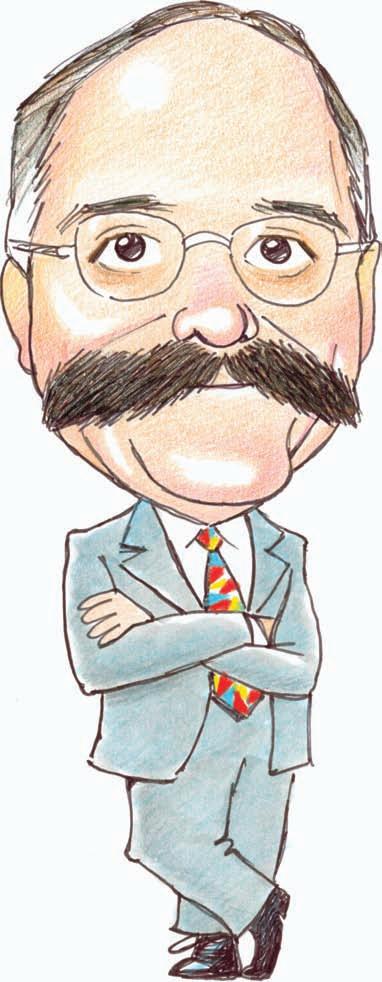
Driver: “Are you Larry?”
Robber: “Are you Malik? I’d appreciate if you can step on it... Hey, are these peanuts for anybody?”
Personally, I like to use valet when I rob a casino. That way, I’m sure to have cash to tip the attendant who brings my car. Smart, huh?

50 Global Gaming Business DECEMBER 2022
CUTTING EDGE
by Frank Legato
Modern Classic
PRODUCT: Player
Classic Signature
MANUFACTURER: Everi Holdings
proves game marketability with an updated topper to match the cabinet’s aesthetic.
P
layer Classic Signature, the newest addition to Everi’s three-reel cabinet portfolio, is inspired by the more than 15 years of success of the Player Classic and Skyline cabinets, which continue to rank as top cabinets in industry reports year after year.
The innovation behind Player Classic Signature means that it was built for the future, while the classic look and feel honors and respects the rich history of Player Classic and the loyal stepper player.
Everi’s deep understanding of the classic threereel mechanical player guided its design decisions, resulting in enhanced overall functionality from viewing angles to creature comforts. The cabinet features a four-button deck for easy bet selection and quick play, a clear digital touch meter panel to improve player ergonomics, and wider, more intelligent and more powerful spinning reels for added excitement.
The interactive pay tables are large and positioned front and center to help simplify game play while the high-resolution 28-inch top box monitor im-
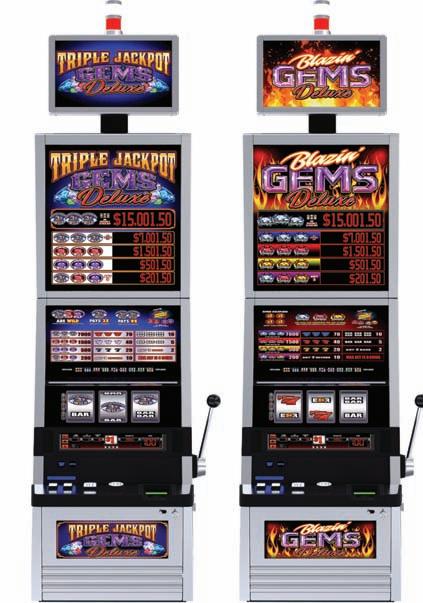
Player Classic Signature features several elements that operators will appreciate, including better thermal management and serviceability. Game conversions are smoother with the transition to an LCD for the pay tables and the belly glass is easier to convert. The simplified button deck consists of just four buttons, eliminating deck changes for games. The new technology integrated into Player Classic Signature also enables Everi to deploy high-performing threereel mechanical games in markets that historically have only consisted of video product.
Player Classic Signature launched with three distinct game families, each consisting of a pair of classic stepper titles—the Gems Deluxe Series, the Jackpot Power Series, and the Extra Spin Series. These games are reflective of Everi’s commitment to innovation in the mechanical space and at their heart align with elements stepper players appreciate—a math-first focus, unique play mechanics, and dynamic art and audio.
Player Classic Signature indicates the core mechanical segment is stronger than ever as the cabinet was the most demanded pre-launch Games product Everi has ever had since its debut with positive reviews from customers and trade press alike. The cabinet and its launch themes have performed well in the field since its first deployment in March 2022.
For more information, visit everi.com.

DECEMBER 2020 www.ggbmagazine.com 51
GOODS&SERVICES
Sightline’s flagship Play+ product enables consumers to access gaming and entertainment in nearly every regulated digital gaming company in the United States.

The deal marks the first in Ontario to involve this type of product, said Great Canadian CEO Tony Rodio.
J.P. MORGAN INVESTS IN SIGHTLINE PAYMENTS

Sightline Payments has announced the completion of a funding round following a strategic investment from J.P. Morgan Payments. As part of this deal, Sightline will work with J.P. Morgan Payments to develop an integrated omnichannel solution for resort and online gaming companies, serving the resort, entertainment and lodging ecosystem.
“A gaming patron’s money should be safe, secure, and should follow that patron effortlessly through their digital and brick-and-mortar life cycle. We are confident that a strategic relationship with J.P. Morgan Payments will allow us to deliver a unique mobile user experience for those gaming industry patrons and power the digital transformation for gaming operators,” said Sightline cofounder and Co-CEO Omer Sattar.
KAMBI
PROVIDES
SPORTSBOOK SOLUTION TO ONTARIO CASINOS

The Kambi Group signed a multi-year agreement to work with 10 Great Canadian Gaming casinos in the province of Ontario, including the newest, Pickering Casino Resort. Kambi, which provides sports betting services, will power the sportsbooks.
The sportsbooks will include the latest betting kiosks. While Kambi’s revenue stream for 2022 from this partnership isn’t much, it expects to improve come 2023.
Kristian Nylén, Kambi CEO and co-founder, said, “I am delighted to form this exciting sports betting partnership with Great Canadian, which is rightly regarded as one of Canada’s premier gaming and entertainment companies with an unrivaled retail footprint.”

INCREDIBLE TECHNOLOGIES, BRAGG GAMING ANNOUNCE iGAMING PARTNERSHIP
Incredible Technologies, Inc. (IT) has announced a new partnership with Bragg Gaming Group to extend its distribution of IT iGaming products.
Incredible Technologies has a decade-long tenure of casino gaming hardware and software development experience. The company’s land-based success extends to iGaming platforms with titles like Crazy Money 2 and Big Prize Bubblegum Deluxe, both already available via Bragg’s remote games server (RGS) technology. IT’s existing partnership with Spin Games, acquired by Bragg earlier this year, sets a strong foundation for the innovation to come.

Bragg’s interactive catalog is available in numerous markets, including New Jersey, Pennsylvania, Michigan and Connecticut with partners DraftKings, FanDuel, Caesars Entertainment and Rush Street Interactive. Through this new partnership, IT’s new content will gain expanded access to existing and future customers.
KONAMI’S BATTLEBOTS SLOTS PREVIEW IN LAS VEGAS
The world’s first BattleBots casino slot games debuted at World Championship VII in Las Vegas in September, ahead of the official launch in casinos in November. The game was created by global casino games developer Konami Gaming.
BattleBots slots feature iconic environments, sounds, scenes and machines from the popular robotic combat sport and TV show broadcast in over 150 countries. BattleBots slots invite players to take part in a clash for cash, as reel symbols, bonus events and action sequences bring top bots roaring to life.
“Since BattleBots slots were first announced, fans in markets from across the globe have expressed interest and excitement,” said Tom Jingoli, executive vice president chief operating officer at Konami Gaming, Inc. “The anticipation around the world’s first BattleBots slots is unmistakable, and the wait is nearly over.”
52 Global Gaming Business DECEMBER 2022
DAVID TSAI NAMED CEO OF CROWN PERTH

Australia’s Crown Resorts has announced that David Tsai, a longtime executive at MGM Resorts International, will be the new CEO of its Crown Perth casino.
According to a company release, Tsai will begin his tenure “later this year”—his appointment is still subject to regulatory approval.
Prior to taking the top job at Crown Perth, Tsai most recently served as president of MGM’s Midwest division. He also previously held other seniorlevel positions at various MGM properties.
It’s been a turbulent 12 months for Crown, as the operator has been deemed unsuitable for casino licensure and Victoria, New South Wales and Western Australia. These licenses were reinstated conditionally, however, upon Crown’s sale to U.S.-based Blackstone Group earlier this year.
In a statement, Crown CEO Ciarán Carruthers said, “As CEO of Crown Perth, David will lead our remediation action plan in Western Australia and work with the Crown Perth board and the newly appointed independent monitor, Paul Steel, to implement the recommendations of the Perth Casino Royal Commission.”
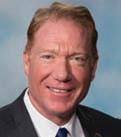
CHICKASAW LEADER LANCE NOMINATED TO ARISTOCRAT BOARD
Aristocrat Leisure Limited announced that Bill G. Lance Jr. has been nominated as a non-executive director of the company’s board of directors, subject to relevant regulatory approvals.
A prominent Native American tribal leader in the United States, Lance was the longest-serving secretary of commerce in the history of the Chickasaw Nation, a major Oklahoma-based tribe, where he was responsible for 7,000 employees and more than 60 gaming, hospitality, retail and media commercial operations.
Upon stepping down as secretary of commerce, Lance was given the honorary title of the Chickasaw Nation’s secretary of state as part of a planned succession. Lance is also a member of the board of the Chickasaw Foundation and serves on the board of directors of the NASDAQ-listed company BancFirst. He previously served as a member of the board of trustees for the University of Oklahoma Foundation, the Oklahoma Department of Com-
merce Advisory Council, and as a regent for the University of Arts and Sciences of Oklahoma.
RHEA LONEY NAMED CHIEF COMPLIANCE OFFICER FOR BETMGM
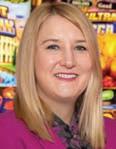
BetMGM recently announced that Rhea Loney will join its executive team as chief compliance officer. Loney will oversee BetMGM’s compliance department, including online and retail operational compliance, registration and licensing, AML and financial compliance, and responsible gaming.
Loney joins BetMGM from Penn Interactive, the online subsidiary of Penn Entertainment, Inc., where she served as VP of compliance, regulatory affairs & strategy. While at Penn, she helped build the compliance team, including licensing, regulatory affairs, operational compliance, risk & fraud, AML, and responsible gaming departments. Additionally, Loney oversaw the online launch of Barstool Sportsbook in 13 states, iCasino in four states and over 20 retail sportsbook launches.
Prior to Penn Interactive, Loney served as an assistant attorney general with the Louisiana Department of Justice, Division of Gaming. While there, she represented and provided legal counsel to the Louisiana State Racing Commission from 2011 to 2019 and was first to administratively prosecute the Dermophin (Frog Juice) cases in the U.S.

LAM NAMED DEPUTY CEO OF RESORTS WORLD SENTOSA
Genting Singapore Ltd., operator of Resorts World Sentosa (RWS), announced the appointment of Lam Yi Young as deputy chief executive of the integrated resort, with Andrew MacDonald confirmed as chief casino officer.
RWS is one of two integrated resorts in Singapore, along with Marina Bay Sands, a Las Vegas Sands property.
Lam will assist CEO Tan Hee Teck “in the execution of the strategies, management, and development of RWS’s business, and ensure effective day-to-day operational performance and organizational excellence,” per the statement from Genting.
Lam was CEO of the Singapore Business Federation from 2020 to 2022, and spent 11 years in senior public sector leadership roles. He was previously a deputy secretary at the Singapore Ministry of Trade and Industry and deputy secretary at the Ministry of
Education. Lam also served as CEO at the Maritime and Port Authority of Singapore.
In another key appointment, effective September 1, MacDonald was installed as chief casino officer at RWS. MacDonald will manage “overall casino business” at the property.

He has more than 40 years of experience in the gaming industry, and served most recently as corporate senior vice president and chief casino officer at casino operator Las Vegas Sands Corp. McDonald also previously served as executive vice president of casino at Sentosa’s market rival, Marina Bay Sands.
ICRG ELECTS EILEEN MOORE JOHNSON TO GOVERNING BOARD
The International Center for Responsible Gaming (ICRG) has announced the election of Eileen Moore Johnson, Vegas Loop general manager of the Boring Company, to its governing board.
Arthur Paikowsky, president of the ICRG, stated, “We are honored to have an outstanding industry leader like Eileen Moore Johnson join the ICRG board. She brings a wealth of experience in the gaming industry and a deep commitment to responsible gambling.”
Previously, Johnson served as executive vice president and chief human resource officer for Scientific Games, where she focused on developing and executing the company’s global human resources and corporate social responsibility strategies.
Acres Manufacturing . . . . . . . . . . . . . . . . . . . . . .7
AGEM . . . . . . . . . . . . . . . . . . . . . . . . . . . . . . . .47
AGS . . . . . . . . . . . . . . . . . . . . . . . . . . . . . . . . . .2
Aristocrat Gaming . . . . . . . . . . . . . . . . . . . . . .56
Bluberi . . . . . . . . . . . . . . . . . . . . . . . . . . . . . . . .9
Casino Player Media . . . . . . . . . . . . . . . . . . . . .41
Everi . . . . . . . . . . . . . . . . . . . . . . . . . . . . . . .5, 43
Fantini Research . . . . . . . . . . . . . . . . . . . . . . . .53
Global Gaming Business . . . . . . . . . . . . . . .45, 51
IGT . . . . . . . . . . . . . . . . . . . . . . . . . . . . . . . . . .11
J Carcamo & Associates . . . . . . . . . . . . . . . . . .49
JCM Global . . . . . . . . . . . . . . . . . . . . . . . . . . . .21
Lewis Rocca . . . . . . . . . . . . . . . . . . . . . . . . . . .39
Playtech Ltd. PT Services Delaware . . . . . . . . .17
Red Square Agency . . . . . . . . . . . . . . . . . . . . .55
Reed Expo(RX) . . . . . . . . . . . . . . . . . . . . . . . . .25
World Game Protection . . . . . . . . . . . . . . . . . .31
UNLV Division of Philanthropy . . . . . . . . . . . . .29
DECEMBER 2022 www.ggbmagazine.com 53
PEOPLE December 2022 Index of Advertisers
GGB
Bill Lance Jr.
Lam Yi Young
David Tsai
Rhea Loney
Eileen Moore Johnson
QA
& Simon Thomas
CEO, Hippodrome Casino

London’s Hippodrome Casino is one of the most unusual in the world. With a history dating back over a century, the Hippodrome was a theater for much of its existence, hosting such events as circuses, aquatic extravaganzas, nightclubs and more. When Simon Thomas and his father Jimmy, who recently passed away, took over the property in 2009, they embarked on a complete restoration project that transformed the property into what it is today: one of England’s finest casinos. Simon Thomas sat down with GGB Publisher Roger Gros at G2E in October to talk about the past and the future of the Hippodrome. For a full video and audio podcast of this interview, visit GGBMagazine.com.
Global Gaming Business: First of all, condolences on the passing of your father. He was such a legend in the London gaming scene.
Simon Thomas: Thank you. It’s strange, actually, because the last few years as he was slowing down, he used to come with us on the Vegas trip for G2E. It was really quite hard work, but it was hard to keep up with him. Now he’s not here. I really miss him.
Let’s talk about how you got through the pandemic. We know it was tough here in the U.S., but it seemed like they were shutting gaming down in the U.K. every week. How difficult was it really?
To put it bluntly, it was horrible. Over the 420 days between first lockdown and final reopening, we were closed by the government for 320 days, and of the other 100, we had severe restrictions such as curfew and other mad restrictions for 60 of the days.
What we found, though, every time we were allowed to reopen business came back really quickly. And the Covid journey for us was quite interesting because in true Hippodrome style, we turned it into an opportunity. Once we realized we’d find a way through, it became really interesting.
We brought forward quite a lot of ambitious building projects and future-proofing to the building. We replaced all air conditioning and we added another floor on the top of the building. We completely removed and refurbished all our poker rooms and purchased opportunistically the last two bits of the building that we didn’t control, two shop units on the front where we recently opened a Chinese restaurant called Chop Chop. In the other one, we are opening a cafe and then a secret bar in the basement in about two months’ time.
And then when we were forced to restrict capacity, it wasn’t worth us playing to the lower end of the market when we could only allow half our customers into the property. So we increased our minimums, and I think in hindsight we realized that we’d been underpricing ourselves, because we’d come out of it in an incredibly strong position with much higher minimum spends. So we’re finally having fun.
So you didn’t have to do anything special to attract the customers back?
Oh, no. There was enormous pent-up demand. People were anxious to get out again. The Covidshy people didn’t come out, but there was nothing we could have done that would have got them to come out.
In the meantime, the government has plans to issue a white paper of reforms to the gaming industry in the U.K., but due to the political upheaval in Britain it’s been delayed. Where does that stand, and how will it affect you?
They did a call for evidence, and obviously the people who are very pro-gambling gave their evidence. Then people very anti-gambling gave theirs and nobody really bothered with the middle. We are certainly going to have a white paper, which will lead to some change in the legislation. We’re hoping that the more extreme ideas will be curtailed. Ironically, the delays have given us time
to have much better dialogue with the regulator.
From the land-based casino side, it was always going to be a good. We have been hamstrung by old regulations that limit us to 20 slot machines in a casino peak time, so when I’ve got 1,500 customers in the building, there are queues of people in front of the slot machines, and we’re hoping that will increase. It’s frustrating as hell when I can’t service the customer demand.
Finally, we’ve been pushing for some electronic versions of table games, which are really good because customers want it. They want to play at their own pace. They want to play at a lower stake. We’ve had the opportunity to convince the regulators, I hope.
“
Some of the impact of Brexit was supposed to hit the gaming industry pretty hard. Has it hit hard, or is it water under the bridge at this point?
The biggest negative of Brexit is that it’s harder to get European staff. But a whole load of European staff are already allowed to work in the U.K. They have that right to work. But to be fair on the hospitality side, it’s not just British, it’s worldwide. Everyone is short hospitality staff. So it’s not a Brexit effect.
Currently the Pound Sterling’s quite weak, so we’re starting to see an increase in tourism, which is a hidden benefit of Brexit. There are plenty of supply chain issues, but they’re also not Brexit, they’re worldwide. And I think it’s difficult to tell what is Brexit and what is just the after-effects of shutting the world economy down courtesy of Covid.
54 Global Gaming Business DECEMBER 2022
CASINO COMMUNICATIONS
Every time we were allowed to reopen business came back really quickly. And the Covid journey for us was quite interesting because in true Hippodrome style, we turned it into an opportunity. ”
Good people. Giant possibilities.
What do you get when two of the country’s best gaming-focused ad agencies join forces? A new firm dedicated to bringing true marketing innovation to gaming and resort properties from coast to coast.
Say hello at GoodGiant.com
 Chicago | Mobile | Reno | Tulsa
Chicago | Mobile | Reno | Tulsa







 By Frank Legato
By Frank Legato























































































































































 Chicago | Mobile | Reno | Tulsa
Chicago | Mobile | Reno | Tulsa








